






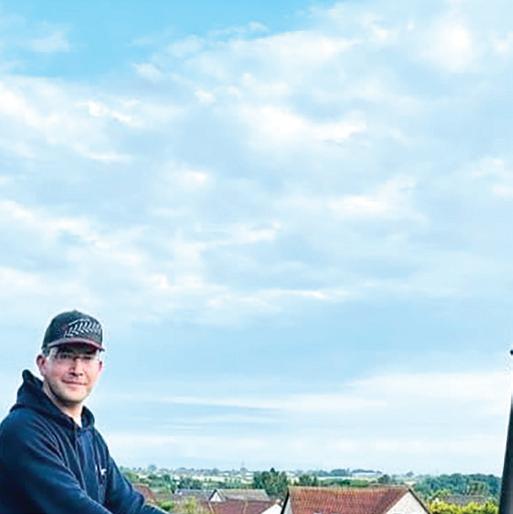
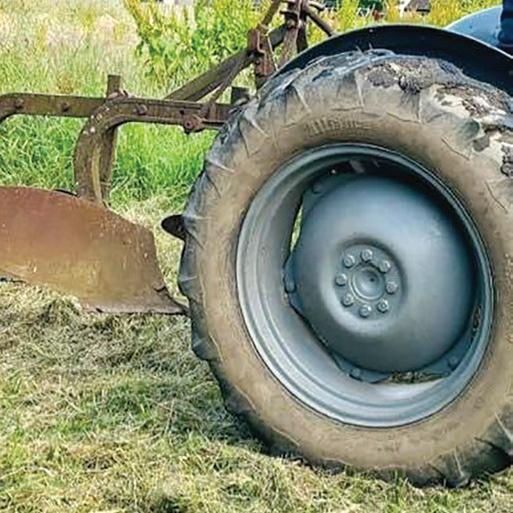
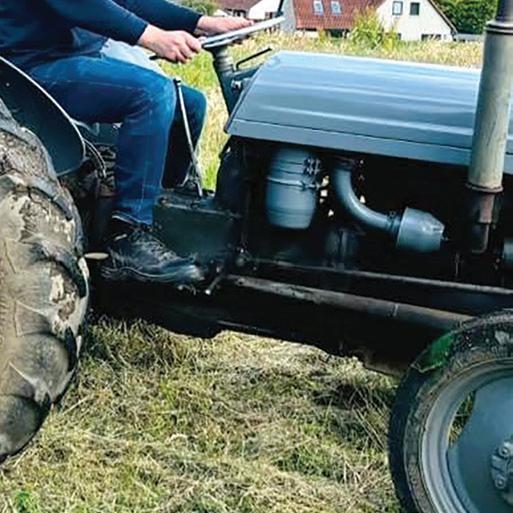


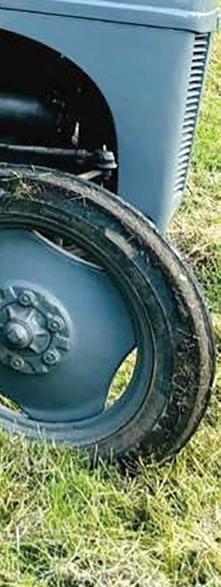
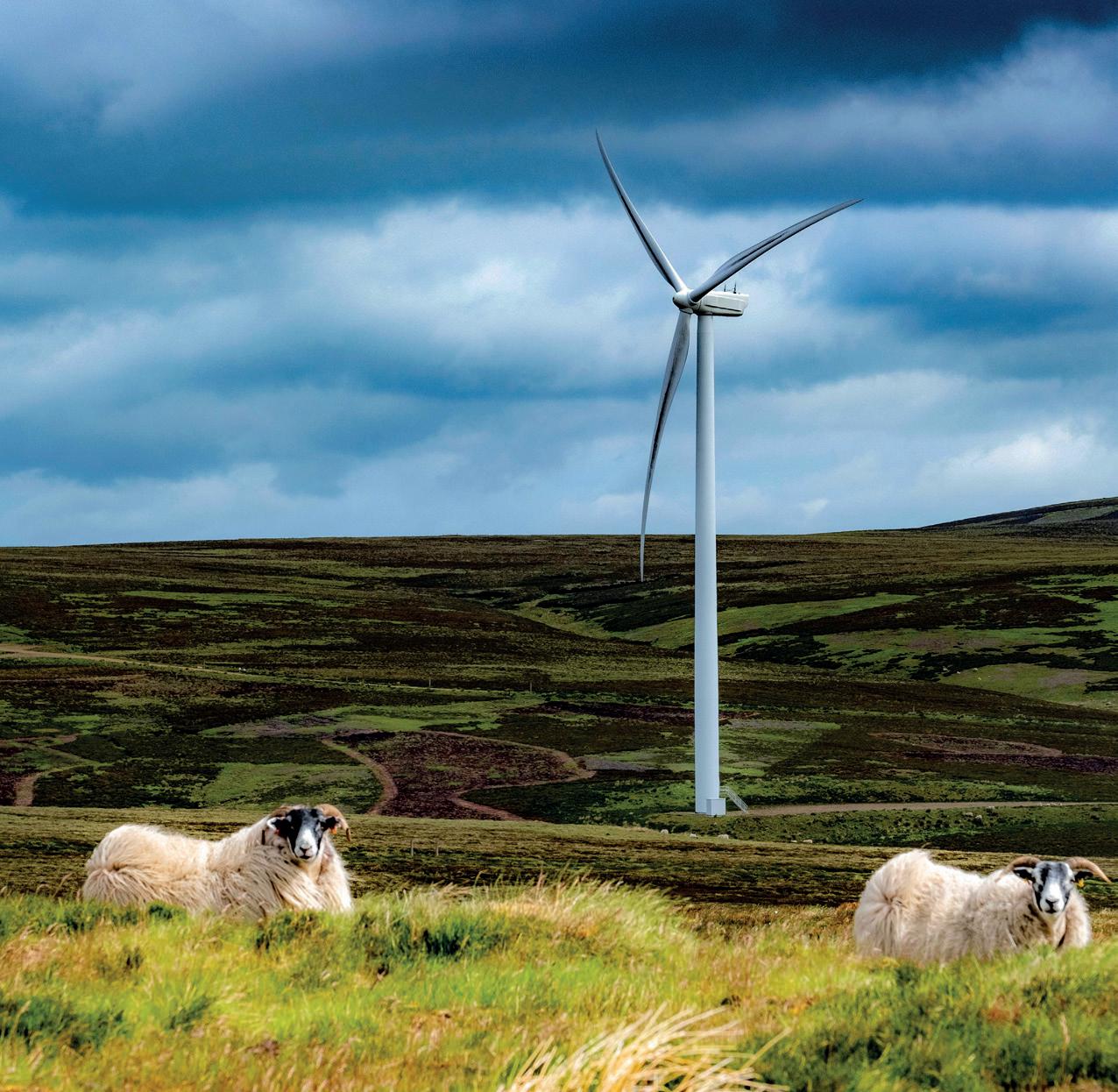
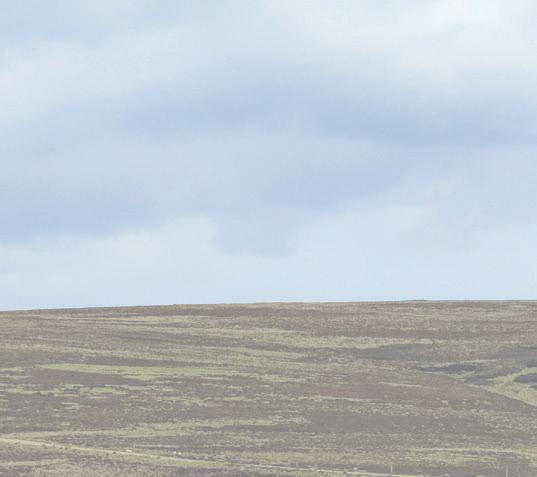
Do you have land you would like to diversify or are you interested to hear about how renewable energy could work for you?


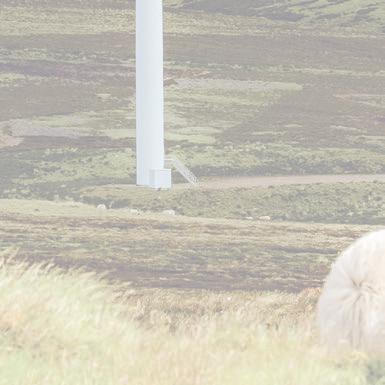
EDF Renewables UK is one of the country’s leading renewable energy developers in Scotland and we work hard to build lasting relationships with our trusted partners Our aim as a business is to accelerate to a net zero future where clean energy powers our lives
Here are some of the benefits of working with EDF Renewables UK:
• By leasing land as part of an agreement, you are reaffirming your commitment to helping the country to meet net zero and playing your part in that.
• Through a partnership a long term lease can bring a stable income for over 30 years.
• We work closely with our partners and the communities around our sites; with dedicated project managers, our goal is to enable local communities to reap the benefits of renewable energy developments.
• Community benefits – our wind farms in Scotland currently plough millions into local projects and initiatives throughout the year – from education and skills; investment in local communities and to environmental projects as well as initiatives for the elderly.
Please do reach out if you would like to discuss opportunities you may have with the project team or find out more information about working with us.
Contact Sarah Dooley, Principal Development Manager, EDF Renewables UK directly via: Sarah.dooley@edf-re.uk www edf-re.uk


NFU Scotland, Rural Centre, West Mains

Ingliston, Edinburgh EH28 8LT
NFU Scotland, Rural Centre, West Mains Ingliston, Edinburgh EH28 8LT
NFU Scotland, Rural Centre, West Mains

EH28 8LT


Tel: 0131 472 4000 www.nfus.org.uk nfuscotland @NFUStweets
Ingliston, Edinburgh
H0131 472 4000 www.nfus.org.uk nfuscotland @NFUStweets @nfuscotland
Tel: 0131 472 4000

OW often do you see or learn about something and think ‘I’m up for that’, but then never actually realise that positive thought/ silent commitment? Possibly too often or not at all.
Editor Diana McGowan editor@nfus.org.uk
www.nfus.org.uk
nfuscotland
Design & Production
Editor Diana McGowan editor@nfus.org.uk
@NFUStweets
Mark Shreeve mark.shreeve@micropress.co.uk
Managing Editor
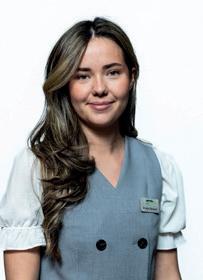
HOW often do you see or learn about something and think ‘I’m up for that’, but then never actually realise that positive thought/ silent commitment? Possibly too often or not at all.
Brooke Harwood
With Diana attending the International Federation of Agricultural Journalists Congress in Switzerland,
Craig Gibson
Andrew Hirst andrew.hirst@micropress.co.uk
Advertising Sales
Design & Production
Editor Diana McGowan editor@nfus.org.uk
Ryan Swinney
Danny Lewis 01502 725862 danny.lewis@micropress.co.uk
In this month’s magazine, our two features cover inspiring stories and highlight just how rewarding delivering on such thoughts can be both for the individual involved and others who may benefit along the way.
Scottish Farming Leader’s editor hat has been passed to myself. For those of you I have not yet been fortunate to meet, I am the Communications and Social Media Assistant at NFU Scotland.
Advertising Sales
Managing Editor
Craig Gibson
Mark Tait 01502 725803 mark.tait@micropress.co.uk
Clare Stebbing clare@connect communications.co.uk
In this month’s magazine, our two features cover inspiring stories and highlight just how rewarding delivering on such thoughts can be both for the individual involved and others who may benefit along the way.
Tel: 0131 561 0024
Design & Production
Ryan Swinney
Published on behalf of NFU Scotland by COUNTRYWIDE PUBLICATIONS
Coming from a non-farming background in Biggar, South Lanarkshire, the past eight months in the role have been an enjoyable, albeit sometimes challenging, learning opportunity. It’s realistic to say my farming knowledge before NFU Scotland stretched to knowing the colour of a New Holland tractor, after a school classmate was dropped-off in one by her Dad. Despite being surrounded by agriculture my entire life, I was admittedly naïve to the work put in by Scotland’s farmers and crofters to deliver highquality produce. Thanks to our welcoming members and patient staff, I can confidently say this has absolutely changed.
Advertising Sales
Clare Stebbing
Fountain Way, Reydon Business Park, Reydon, Suffolk IP18 6SZ 01502 725800
Published on behalf of NFU Scotland by Connect Publications (Scotland) Ltd.
Printed by MICROPRESS PRINTERS LTD
clare@connect communications.co.uk
Studio 2001, Mile End, 12 Seedhill Road, Paisley PA1 1JS
Tel: 0131 561 0024
Fountain Way, Reydon Business Park, Reydon, Suffolk IP18 6SZ 01502 725800
Published on behalf of NFU Scotland by Connect Publications (Scotland) Ltd.
Studio 2001, Mile End, 12 Seedhill Road, Paisley PA1 1JS

We’re only a few weeks away from the Royal Highland Show. Over the course of four days, thousands will flock to the show to compete, judge, exhibit, organise, educate and socialise. We’ll see the best of the best and relish the atmosphere. Among the highlights and away from the main show ring, this year will see the welcome return of the Golden Shears Sheep Shearing and Woolhandling World Championships. Taking place at the MacRobert Theatre, the 2023 Worlds will see more than 30 countries compete for the prestigious title and it promises to be an action packed showcase of the art, skill and techniques required to be a world champion.
Perhaps a less well known event taking place at this year’s Highland is the final qualifying round of the 2023 Britain’s Fittest Farmer competition. Taking part in this event for the first time is Kyla Graham from Kirkcudbrightshire. Kyla first spotted the event at the Show last year and while watching it thought ‘I’m up for that’. Kyla knew however she couldn’t just enter there and then. Like any competition, she understood you need to be ready for it and without knowing if she would even enjoy it, she set her mind to it to finding out if she would. Kyla shares her journey from that moment to the present and highlights how she’s benefited already in so many ways both mentally and physically, and explains about the positive impact her preparation has had on her working life.
As well as learning the NFUS ropes, I also had the recent opportunity to explore neurodiversity in the sector. This industry has proudly provided an environment for neurodiverse individuals to strive for some time. David Nicholson, an autism activist with farming connections to a smallholding in Fife, has championed rural life as a coping mechanism for his own neurodiverse challenges. As he prepared to perform at Edinburgh’s Fringe Festival, I caught-up with him to find out more pages 30-32.
Also in this issue, we cover everything you need to know on the Scottish Government’s proposed Galloway National Park. The Union remains entirely in objection to the proposal and has stressed this to politicians, including First Minister John Swinney, since its announcement in July. On page 25, Policy Manager Sarah Cowie explains the Government’s final assessment process, while Ayrshire Regional Manager Mhairi Dawson sets-out all areas affected by the proposal on page 35.
We’re only a few weeks away from the Royal Highland Show. Over the course of four days, thousands will flock to the show to compete, judge, exhibit, organise, educate and socialise. We’ll see the best of the best and relish the atmosphere. Among the highlights and away from the main show ring, this year will see the welcome return of the Golden Shears Sheep Shearing and Woolhandling World Championships. Taking place at the MacRobert Theatre, the 2023 Worlds will see more than 30 countries compete for the prestigious title and it promises to be an action packed showcase of the art, skill and techniques required to be a world champion.
The other feature looks at how a casual conversation during a Christmas lunch turned into the most rewarding and humbling experience for Next Generation Chair, Matthew Steel, one of the many volunteers who have recently delivered much needed 4x4 vehicles to Ukraine to support the war effort. Matthew explains his contribution to the ‘Pickups for Peace’ campaign and reflects on how the unexpected reception received from the Ukrainians has impacted him and those who were involved.
Elsewhere, we catch-up with the NFU Scotland political affairs team on pages 16-17. Following the opening of Parliament, they were in Westminster to begin lobbying with newly elected MPs. Closer to home, Regional Managers followed this by getting politicians on-farm to showcase the value of our fantastic industry all while highlighting prevalent challenges. Deputy CEO and Director of Policy Jonnie Hall highlights our key asks for the Labour Government on pages 27-28.
Finally, as we head towards the longest day, with the hope of some warmer weather on the horizon, I hope you’re remembering to dress for the weather and wear protective sunscreen and hat when you’re out and about. The strength of the sun even on a dull day can prove harmful if exposed without protection. If you need a new baseball cap, visit the NFU Scotland website and purchase one from the branded merchandise in the Members’ Benefits section.
Aside from politics, August sadly marks the end of the summer show season. Our presidential team attended 23 shows this season and loved meeting many of you along the way. Member engagement is critical to the work we do as a Union. That is why we also dive into our fantastic committees and working groups in this issue. On pages 44-49, hear from various committee chairs and members on why you should consider joining.
The other feature looks at how a casual conversation during a Christmas lunch turned into the most rewarding and humbling experience for Next Generation Chair, Matthew Steel, one of the many volunteers who have recently delivered much needed 4x4 vehicles to Ukraine to support the war effort. Matthew explains his contribution to the ‘Pickups for Peace’ campaign and reflects on how the unexpected reception received from the Ukrainians has impacted him and those who were involved.
I hope you enjoy this month’s magazine. Usual programming will resume next month as Diana returns from her overseas work. We all look forward to hearing how she gets on, while I look forward to returning this editor hat to its rightful owner.
Perhaps a less well known event taking place at this year’s Highland is the final qualifying round of the 2023 Britain’s Fittest Farmer competition. Taking part in this event for the first time is Kyla Graham from Kirkcudbrightshire. Kyla first spotted the event at the Show last year and while watching it thought ‘I’m up for that’. Kyla knew however she couldn’t just enter there and then. Like any competition, she understood
“We’ll see the best of the best and relish the atmosphere”
Finally, as we head towards the longest day, with the hope of some warmer weather on the horizon, I hope you’re remembering to dress for the weather and wear protective sunscreen and hat when you’re out and about. The strength of the sun
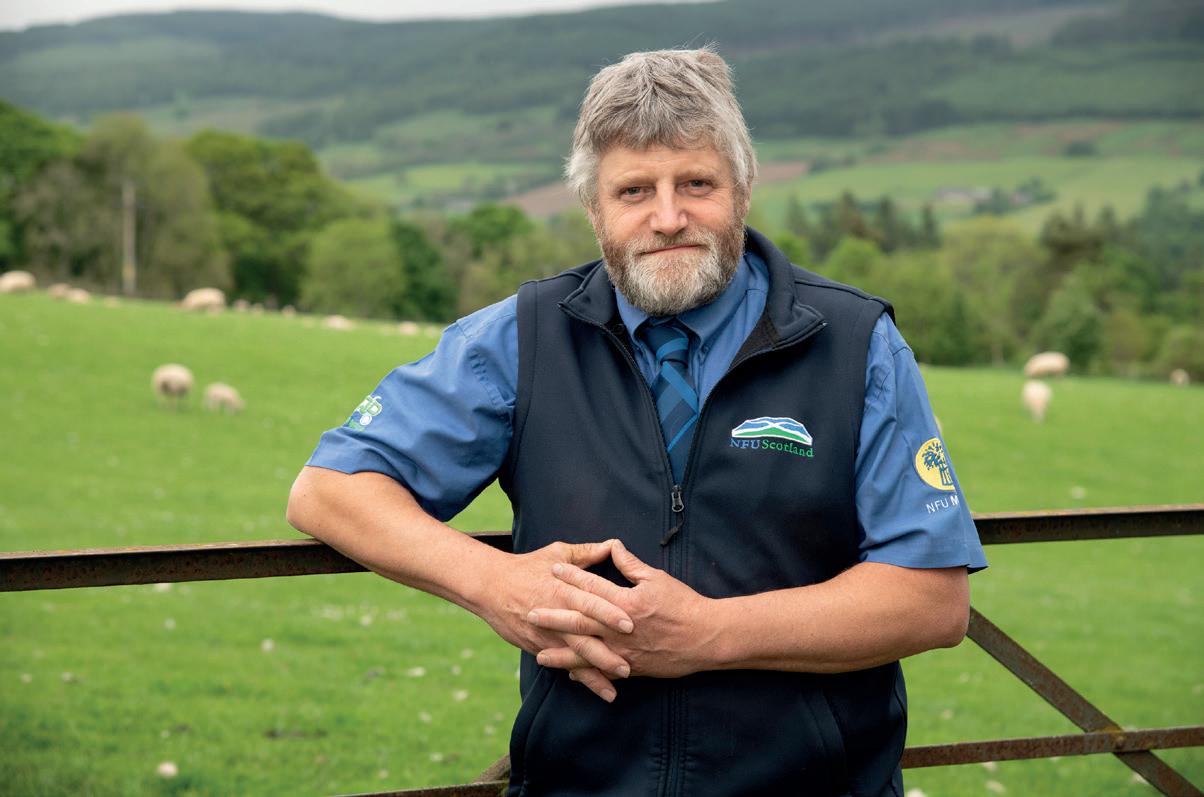
Well now the stoor has settled from a political perspective after the General Election, it would be great to see some stoor fl ying about the fi elds. Although on average according to our rain guage we don’t seem to have clocked up a signifi cant amount of rainfall in total this year, we have had plenty to be problematic when trying to either harvest crops or work with livestock.
the wellbeing of the community as a whole.
It’s certainly been a pretty hectic few weeks for the whole of the NFUS team, and with only a couple of shows left in the calendar, it would be fair to say that our carbon footprint over the summer months hasn’t been that
Lorna Dawson CBE (James Hutton Institute), Ian Wright CBE (UK Food Exports Council Chair) and Heather Kelman (Food Standards Scotland Chair). There were many areas covered relevant to food production with a Q&A that followed. However, one fact that has stuck with me since


I do think however that the agricultural shows so far this year have fared pretty well with most being lucky enough to catch at least some dry if not sunny weather. We all know how important it is to get a good gate on the day to help off set the ever-increasing costs of running a successful event. Of course, it goes without saying that the biggest support and sponsors of any show are those who on a voluntary basis do all the preparations, help set it up and then take it all down again after it’s all over. These events tend to be the biggest day or days within a local community’s calendar which are so important to not only the local economy but also
the biggest support and sponsors of any show are those who on a voluntary basis do all the preparations
great. That said, shows are a great opportunity for us to be in front of many members, not only sharing what we are doing to get the best possible outcome from our members, but also hearing from members directly what your main concerns and ideas are.
At the Border Union Show, I was privileged enough to join a very distinguished panel at their business breakfast on the Friday morning. This is a growing event with getting on for nearly 100 attending. The topic was ‘Food Production, Safety and Exports’. The other panelists were Professor
was the one from Ian Wright. He said that in 1958, 53% of our disposable income was spent on food, that’s incredible. Before Covid we were only spending on average between 8-9 % which has increase since to nearly 14% which everyone is complaining about. That’s the lowest percentage in Europe and the third lowest in the world, a shocking statistic given the relative wealth of the UK.
It’s all about priorities and we’ll continue to press governments to educate the public about the priority of nutritious food, how it’s produced and all it delivers.




NEW SPECIALS
3400s 85 6 furrow 11029380
3300s 85 5 furrow 31026494
EG 300S 100 5 furrow 31026502
ES 250 85 6 furrow 310287730
ES 250 85 5 furrow 11029378
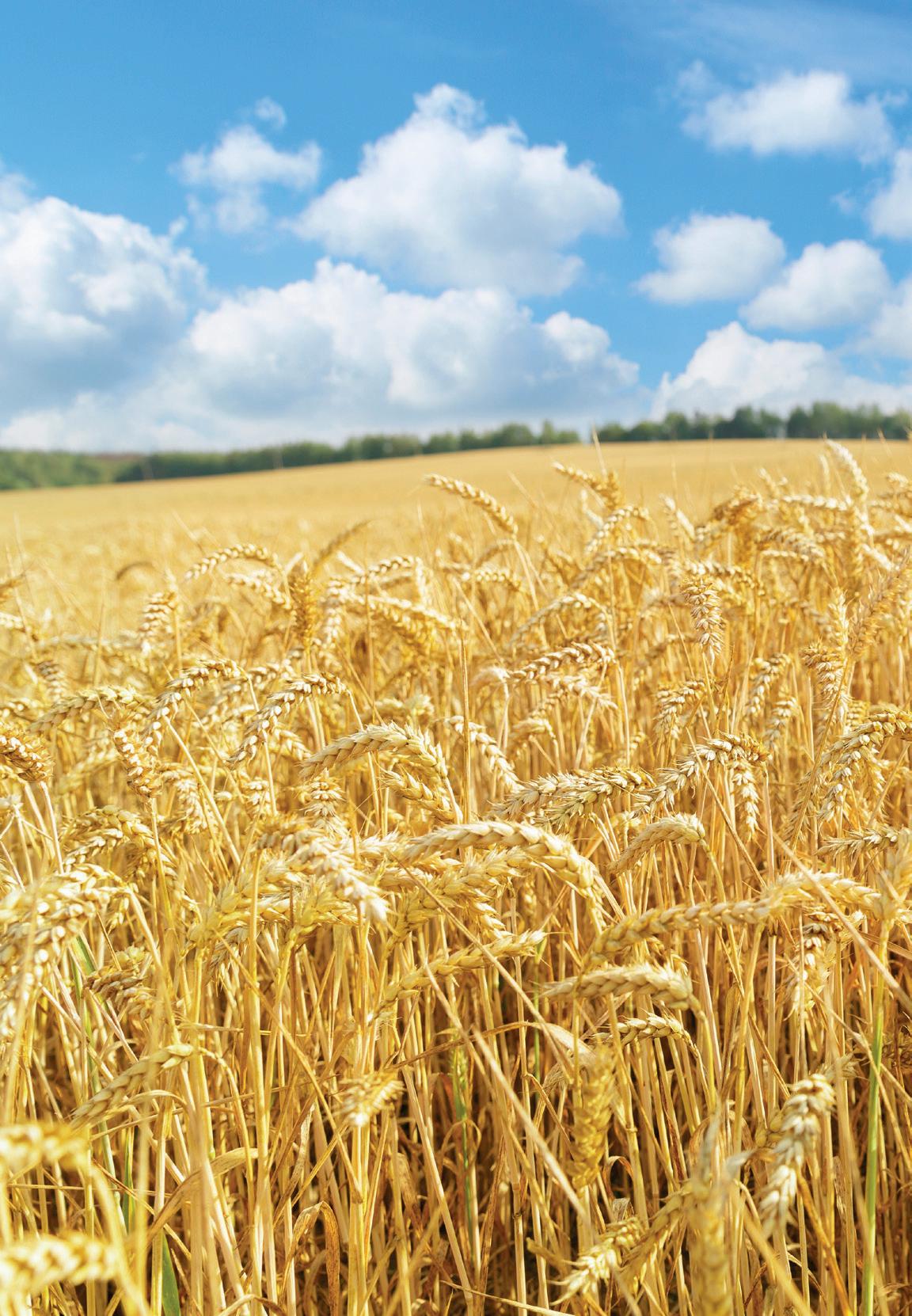


£46,850 (on land )
£35,750 (new style legs)
£31,500 (aged stock)
£32,790
£29,990
TL GEOSPREAD 1875 PRO X2 extensions 3225L
X2 foldable side steps, led lights ,hopper cover , 1 metre section control,
£21,990 11029928
TL GEOSPREAD 1500 PRO X2 Extensions 2800L 1 Metre section control
£20,500 11029924
EL 1400L HYD control £4,950 11029930
BEDNAR SPECIALS:
Swifter disc XE
Swifter disc XO
Swifter disc XO
Swifter disc XO 5000
11028602
31028615
£51,690 31028614
£48,500 11028609
187301
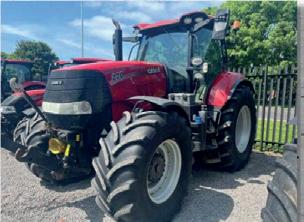







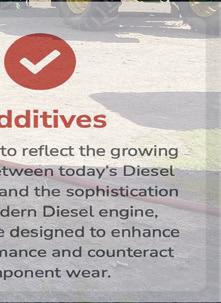






JAndrew Connon Vice-President (overseeing Food & Farming Policy)
uly was busy for food and farming policy. It was good to see fi nished cattle prices fi rming, something that is very much needed. In early July, I visited Arable Scotland where experts discussed the latest technology ideas. Soon after that I joined the Pigs Working Group at Glasgow Docks. It was enlightening and interesting to learn more about the challenges faced by deforestation. As a Union, we have pushed various organisations including retailers, to be clearer with product sourcing in relation to global deforestation.
I also completed work in London as The Voluntary Initiative (VI) Board met to discuss how we should progress. It has been essential we encourage responsible use of pesticides, particularly when access to some key chemicals has been under threat. Then, following the opening of Parliament, I was part of the Union’s team who visited Westminster to meet with politicians




AAlasdair Macnab Vice-President
(overseeing Climate, Land & Business Policy)
s I write, harvest has begun in Scotland with mixed results and some apprehension. Cereal values on the arable side have been concerning, while straw supply and the possibility of draff being unavailable or too expensive is concerning. So, nothing really changes, or does it?
Change is certainly on the way with; an assessment of the proposal for a new National Park in Dumfries and Galloway, a new Government to be lobbied, new electricity infrastructure, restructuring of LFA support, legislation on Land Reform, addressing challenges for new entrants accessing the industry, proposals for beaver translocation sites and crofting consultations.
For my part, it has been about keeping up to speed with the issues. I’ve been closely involved in all by providing direct support to the teams and
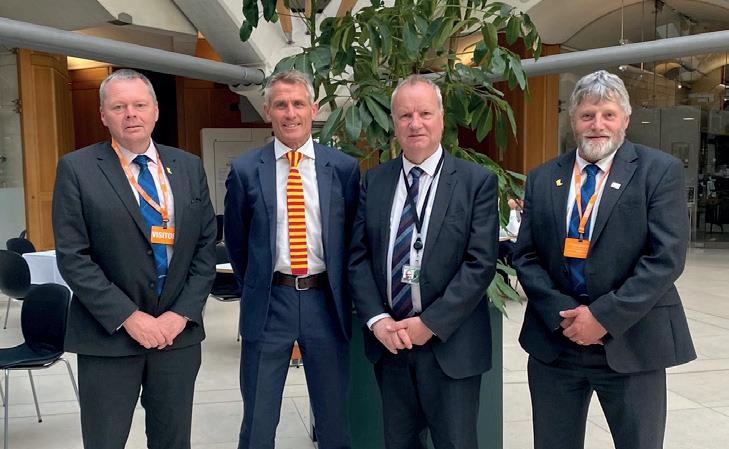
post General Election. We repeatedly drove home the message of the need for an increased, ring-fenced, multi-annual budget for Scottish Agriculture.
We also met with the recently appointed Agricultural Supply Chain Adjudicator (ASCA) Richard Thompson. This was a much-needed appointment to ensure fairer supply chains as dairy producers continue to see mixed fortunes depending on their position on the 10p price diff erence.
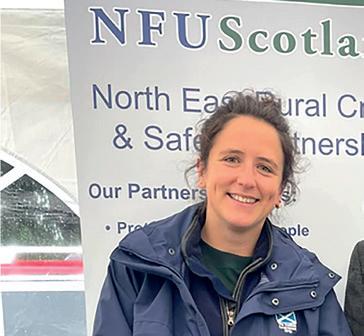
In addition, meeting with Agricultural Industries Confi guration (AIC) gave us the opportunity to discuss how the 2024 harvest was shaping up. Market price volatility, haulage availability and the ongoing aggravations of imported grain were some key topics. Plant health was also mentioned at the Potato Working Group meeting at the end of the month. We’re always looking at practical steps needed to protect high health seed crops.
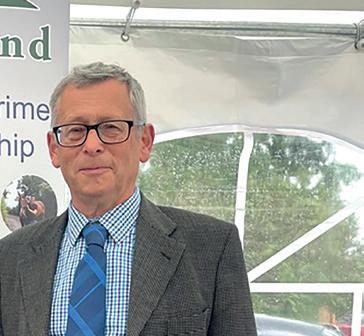

members impacted using my knowledge and industry experience.
The infl uence the Union has in rural business has amazed me. Basing our policy on sound science, proven experience and member views is a very strong position to have. This basis is something which doesn’t change and is the bedrock of our eff ectiveness.
You will be aware we have been looking at how we can engage more eff ectively with members simply for the reasons above. Your views carry weight with Government, agencies and others. I simply ask you to consider being more involved with our branches, regions, webinars and surveys to take our Union to the next level.




















































Asda has worked with its long-standing poultry business partner Glenrath Farms, to improve own-label egg packaging. The team aimed to make Scottish provenance clearer to customers after this was fl agged as an issue in Shelfwatch Phase One.



stores over the summer, clearly displays a Saltire to help customers easily identify the product’s local provenance.

product inside.”




NFU Scotland CEO John Davidson, recently joined Asda on a visit to a Glenrath farm and its packing station near Peebles to welcome the new announcement.
A family business, Glenrath has supplied Asda with eggs for nearly 40 years. The group has also been made supplier for Asda’s own-label egg range in all 90 Scottish stores, meeting the retailer’s increased demand following recent expansion into the convenience sector.
The new packaging, which landed in
Chris Brown, Asda’s Sustainable Agriculture Director, said: “Our longstanding partnership with Glenrath means Asda has always been proud to sell Scottish own-label eggs. However, the NFUS Shelfwatch survey made clear that we could do a better job of communicating this to our customers.
“We are pleased to announce that our own-label eggs sold in Scottish stores now showcase their Scottish credentials clearly on the box. The volume of Asda’s Scottish egg sales is increasing year on year and we hope our customers will enjoy the new packaging as much as they clearly enjoy Glenrath’s great
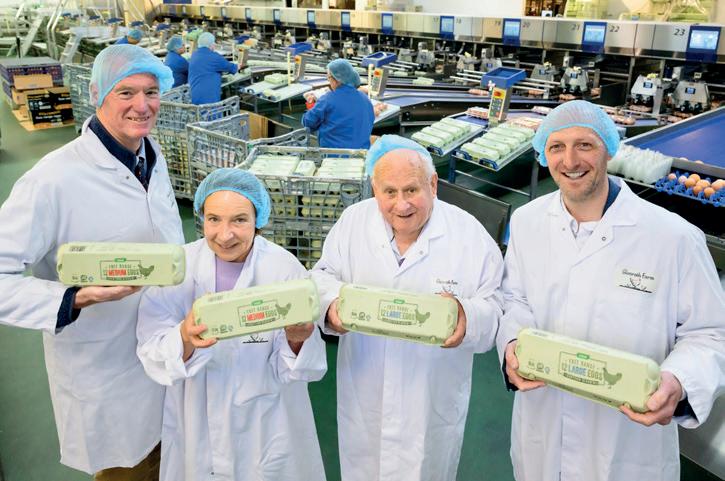
On behalf of NFU Scotland, an independent research fi rm surveyed produce on sale at eight Scottish supermarket chains as part of Shelfwatch. In Phase One, Asda’s Scottish produce score was lower than the retailer expected due to labelling issues. When researchers assessed stores, they were unable to identify some product sourcing from its packaging and marked Asda as having fewer Scottish produce on sale than reality. This re-labelling process aims to address this issue.
Sir John Campbell, Founder and President of Glenrath, added: “We have been very happy to work with Asda for nearly 40 years, it is a key customer of our business. We will continue to work with the team to provide Scottish consumers with the very best that Scottish agriculture has to off er.”
John Davidson was delighted with the news, he said: “It’s great to know that the Saltire will now be on full show across Asda’s own label eggs. I would like to extend my thanks to Asda and Glenrath for working together to make this happen. The purpose of our Shelfwatch campaign is to shine a light on retailer commitment to Scotland’s farmers and growers, and also to encourage the promotion of our Scottish credentials through clearer labelling.
“This development is therefore very welcome. We hope to work closer with Asda in the future and further support its Scottish off er.”
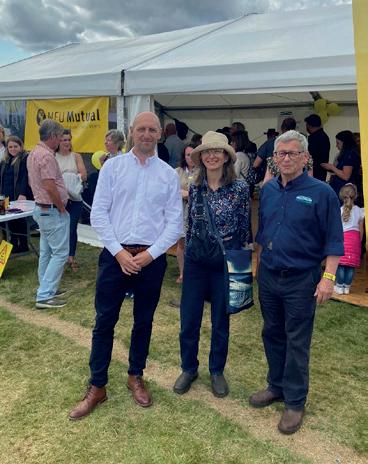
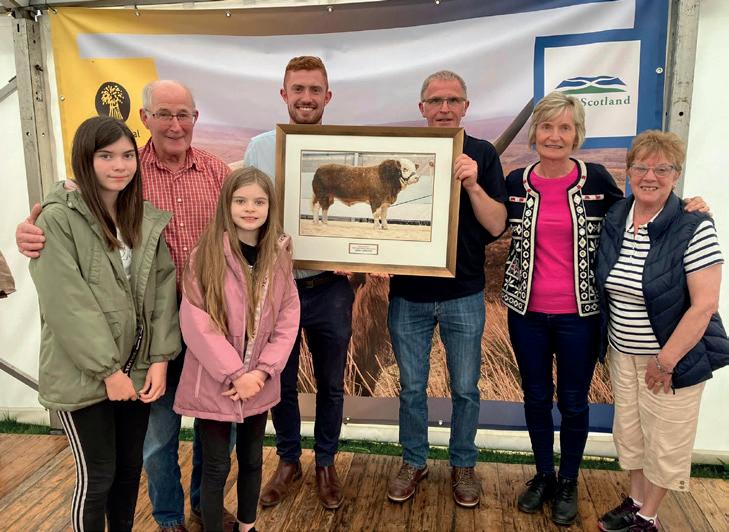
August marked the end of this year’s fantastic agricultural show season. From May, our Presidential Team and staff welcomed hundreds of members to events across all regions. Whilst the Scottish weather may not have been on top-form each week, the social atmosphere and buzz at each show absolutely was.
Thanks go to NFU Mutual for teaming-up with the Union on multiple show stands. President Martin Kennedy said: “It’s been great to visit the regions at agricultural shows and hear what issues are aff ecting members in each area. Whether you’ve been part of NFU Scotland for some time or you’ve just recently joined us, speaking to you all has been the highlight of my summer.
“Roll-on 2025!”
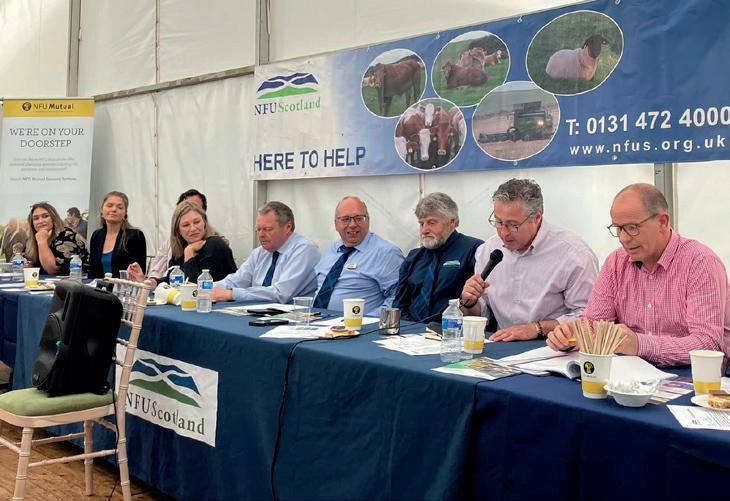
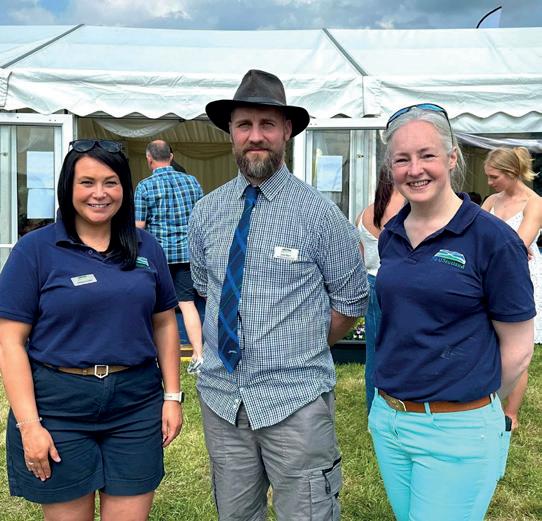
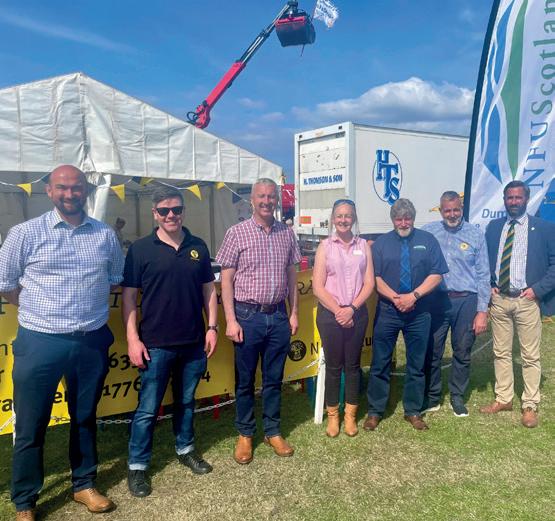




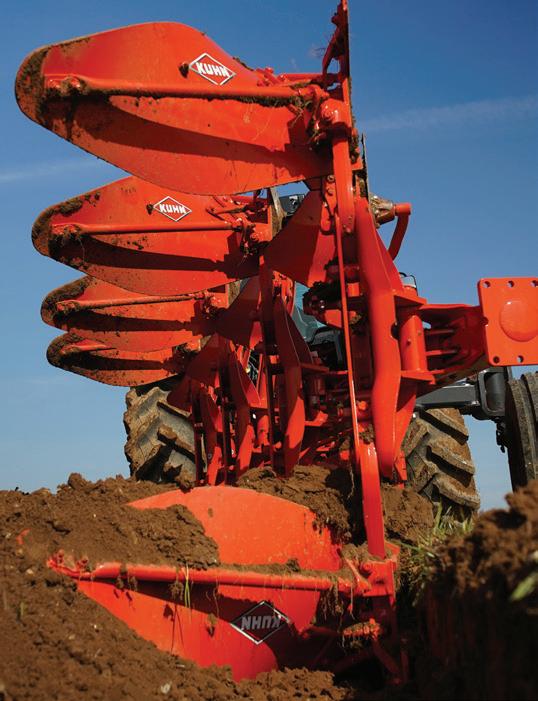

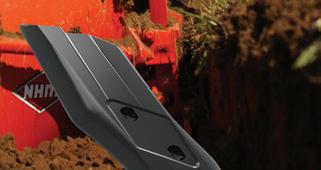






Offering a lifespan of more than 30% compared with the previous generation
KEY ADVANTAGES:
- A reworked tip for a better soil penetration
- Accentuated design to optimise durability
- More regular and even wear over time
- Perfectly matches our standard and carbide ploughshares














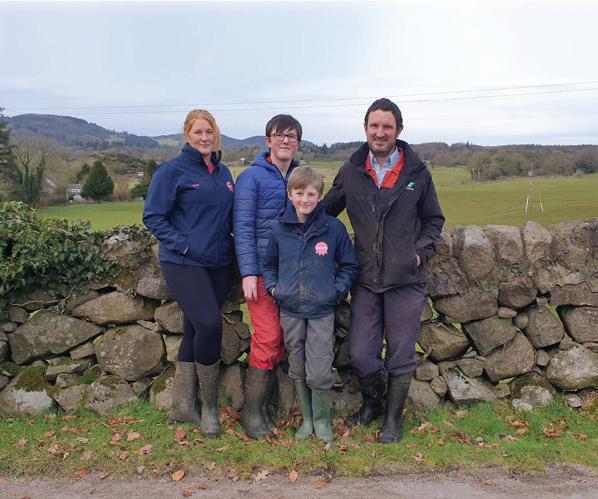
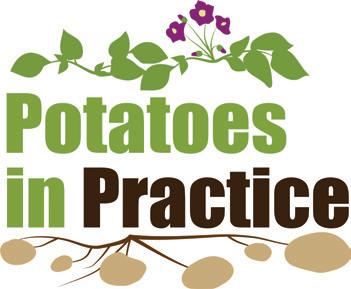
Potatoes in Practice, the largest UK fi eld-based potato event, took place on 8 August at the James Hutton Institute’s Balruddery Farm in Invergowrie, near Dundee.
The event was organised and hosted by the James Hutton Institute in partnership with SRUC, Agrii, Potato Review and Potato World magazine. It highlighted the latest developments in the potato industry along with demonstrations of the latest innovations and emerging trends and of course, moving and static machinery.
From commercial breeders introducing new varieties, to agronomists demonstrating advancements in crop protection and researchers on hand to discuss their most recent fi ndings. Visitors to the event had access to a wealth of scientifi c knowledge and expertise.
Senior Policy Manager specialising in crops John Flanagan, attended the event with NFU Scotland’s Potato Working Group Chair, Graham Twatt.
The economic importance of the Scotland’s red meat sector has been highlighted to supply chain stakeholders by Quality Meat Scotland (QMS). Following the release of its Red Meat Industry Profile report, the team emphasised the industry’s tough resilience on 5 August.
The report highlighted significant opportunity for the £2.8billion Scottish red meat sector to increase its contribution to Scotland’s economy and to food security across the UK. In 2023, turnover from red meat processing in Scotland was estimated to have risen for a fourth consecutive year, lifting 1% to £975million. Despite cost-of-living challenges, people in Scotland spent around 8% more on red meat in 2023, particularly with more affordable cuts.
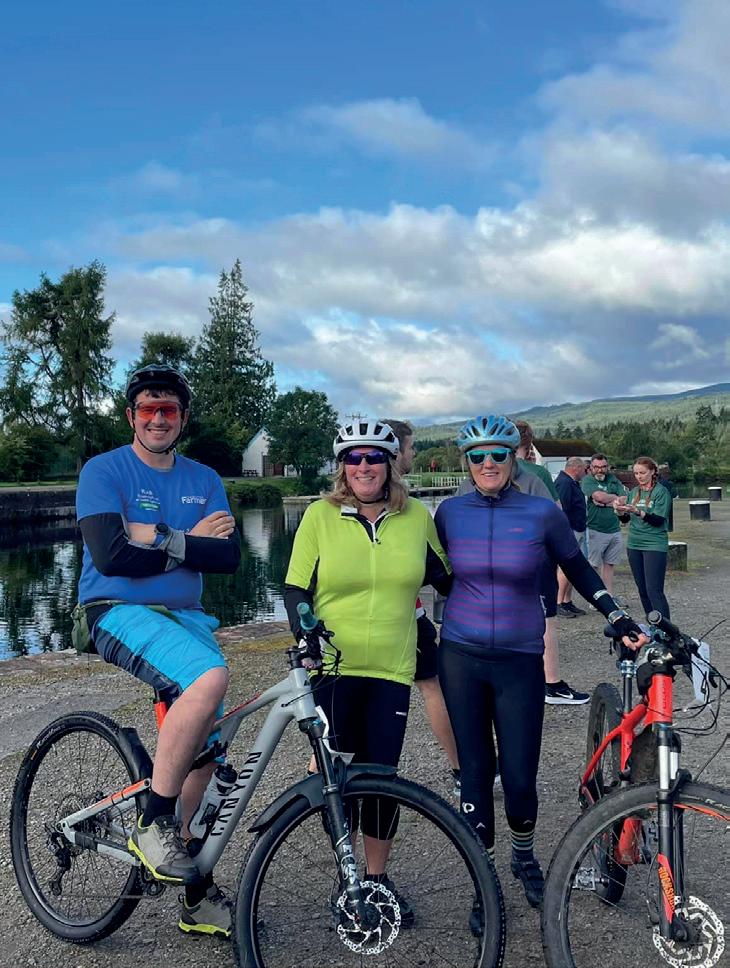
On August 30, NFU Scotland will take part in this year’s Great Glen Challenge in support of RSABI. This is an incredible charity which supports people in Scottish Agriculture by providing practical, emotional and fi nancial aid. With just a few days to go, this is your last chance to sponsor NFU Scotland’s team and contribute towards RSABI’s fantastic work.
Once again, the event has been kindly sponsored by our affi nity partner and legal helpline, Gillespie Macandrew. Two NFU Scotland teams of eager volunteers from our Board, Regional Team and Head Offi ce will walk (18km), run (17km), cycle (49km) and kayak (6km), their way from Fort Augustus Locks to Fort William.
The Great Glen Challenge is RSABI’s biggest fundraising event of the year. We are on track to raise our target of £2000 which will go directly to support the charity’s amazing work. If you would like to sponsor NFUS, you can donate by scanning the following QR code.

President Martin Kennedy welcomed Scotland’s First Minister John Swinney MSP to the family farm in Highland Perthshire recently.
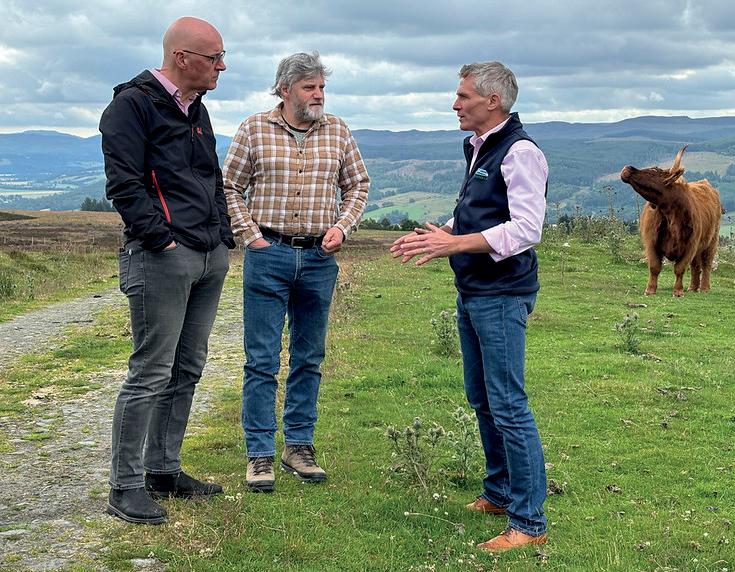
This was the organisation’s first formal meeting with the First Minister (FM) since his appointment in May. The FM was accompanied on the visit by Cabinet Secretary for Rural Affairs, Land Reform and Islands Mairi Gougeon MSP.
Martin’s a tenant farmer in Aberfeldy and farms with his wife Jane and three daughters. Two of Martin and Jane’s daughters, Katrina and Yvonne, accompanied the ministerial party on their tour of the farm.
Formal discussions focussed on future agricultural support In Scotland and funding allocations between the proposed four-tiered framework, specifically the intended budget split between Tier 1 and Tier 2 from 2026
onwards. The transition from current support policies to future support arrangements, to be phased in from now until 2028 and including new conditionality and a replacement for Less Favoured Area support, were also discussed.
Scottish Government backing was also sought for NFU Scotland’s lobbying effort to securing an increased, ringfenced and multi-annual agricultural budget from the UK Government and Scotland’s share of that budget to also increase.
The involvement in the meeting of Martin and Jane’s daughters, Katrina and Yvonne, provided the platform to discuss Scottish Government support for the next generation of
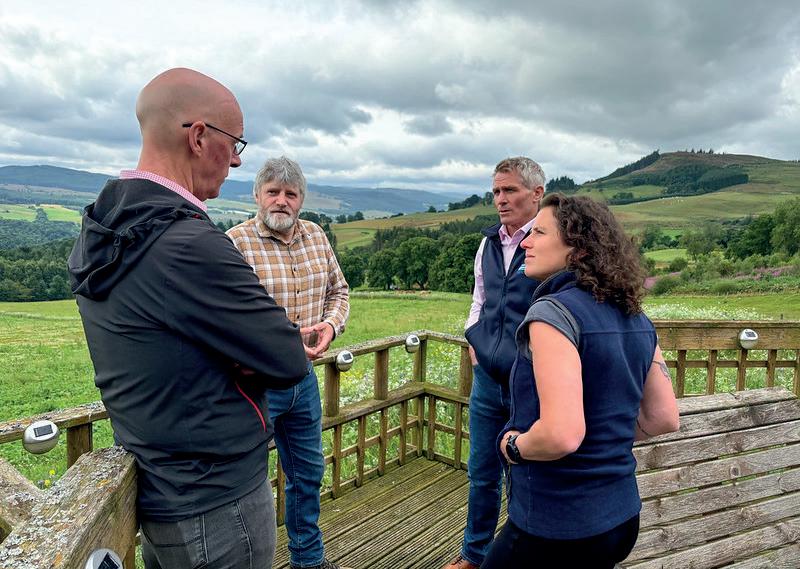
Scottish farmers and crofters and re-engagement with the Starter Farm initiative.
NFU Scotland also took the opportunity to raise concerns over the need for an appeals process as part of the new beef calf scheme; species management; watercourse management; improved application process for capital funding and its opposition to National Park proposals.
Following his visit, FM John Swinney said: “I was very grateful to Martin Kennedy for the invitation to visit his family farm in Highland Perthshire. Engagement with the agriculture sector will be crucial as we manage the transition to net zero, and I was grateful to get the opportunity to see some fabulous examples of good work taking place at Lurgan Farm.
“Scottish Government values its relationship with the farming sector. We will continue to work closely with NFU Scotland and others on issues such as securing a multi-year funding arrangement for agriculture with the new UK Government. That will ensure rural Scotland does not lose out in the wake of Brexit and recognise the capacity of our land to help feed our nation and deliver on climate and nature outcomes.
“Changes to agricultural payments are coming in 2025 and all farmers and crofters need to act now to ensure they are ready. Scottish Government has already provided more than £3.9 million in grant funding in response to 4,700 claims to support agricultural businesses through the Preparing for Sustainable Farming scheme.”

ur Autumn Conference will be held at the Pavilion within the Royal Highland Showground on Thursday 24 October.
Further details of how to book for this all-day event, and the line-up of topics and speakers, are to be confirmed in due course but please keep this date free in the diary. All members are invited to attend.
We are a farm waste management company, based near Dundee and have been trading for 14 years.
Our services include:
• Collection of waste from farm
• Coverage throughout Scotland
• Waste drop off directly to our yard
The types of waste we accept includes: Silage Wrap, Fertiliser Bags, Chemical Drums, Cardboard and Feed Buckets. Mixed loads of waste are accepted to make it as easy and affordable as possible for farmers to dispose of their waste.
Skips also available for scrap metal. Give us a call to discuss your requirements.

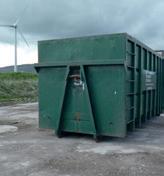
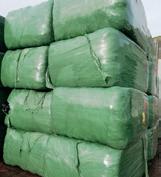
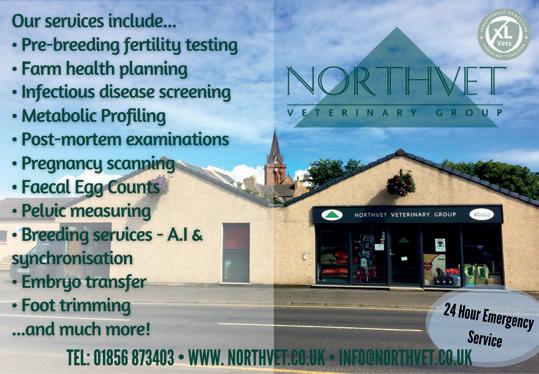


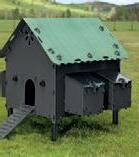
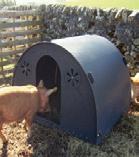
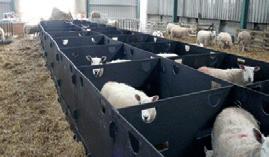
We’ve recently partnered with Police Scotland’s Dog Unit to educate the public on livestock attacks. The Union has worked with the Scottish Partnership Against Rural Crime (SPARC), of which Police Scotland is chair, for some time. With a multitude of stakeholder partners involved, the group’s purpose is to mitigate all instances of rural crime. We’ve taken the lead on livestock worrying (the phrase used when a dog attacks or worries livestock animals in rural or

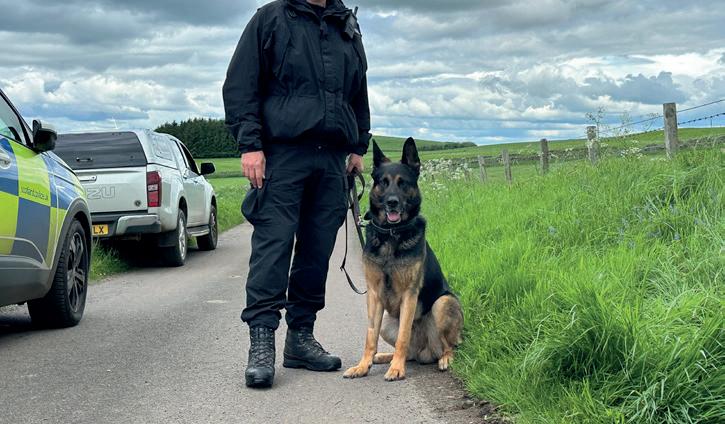
farmland areas) as this is a prevalent issue for members.
Starting earlier this year, we created a series of short videos which highlight the damages of dog attacks to the public and how to control pets in the countryside. The recent video featuring Police Constable Matthew Bendemaker and Police Dog Buzz, is currently
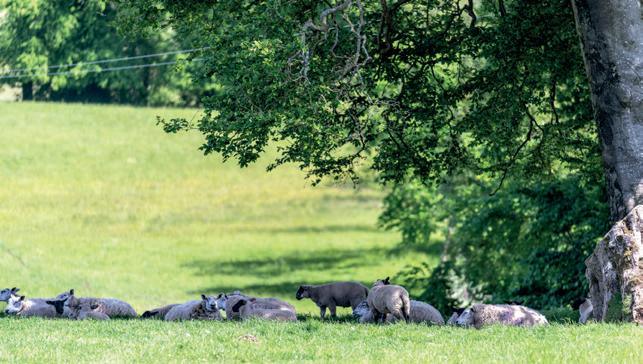
Scottish Forestry is offering farmers in the central belt free woodland assessments to help them add value to their farming business.
The offer applies to all farmers in the central belt area from Ayrshire, Inverclyde, Dunbartonshire right across from the west to Fife and the Lothians in the east. There are limited places so the offer is on a first
come first served basis. The assessment gives farmers a free report detailing potential areas for planting and any constraints, available forestry grants, and valuable information on projected income and expenditure.
You can find out more information by emailing will. chadwick@forestry.gov.scot or checking the Scottish ForestryFarm woodlands website.


on our social media pages ( NFU Scotland, nfuscotland). In the video, PC Bendemaker said: “The dogs have a very high prey drive, which is something all dogs have. Despite the fact that some pets may not appear to have particularly high drive, when met with livestock and other animals, this prey drive can come out in them.”
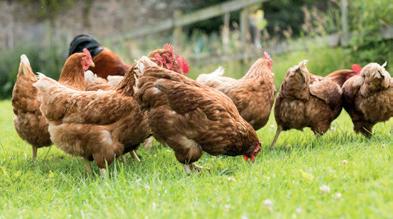
From 1 September 2024, all bird keepers must register their location to Scottish Government as part of the Scottish Kept Bird Register (SKBR). This is a legal requirement to help prevent disease and applies to any flock size, even one bird. Previously, the Great Britain Poultry Register (GDPR) was only mandatory for bird keepers with 50 or more birds. If your premises was documented on GDPR, you must re-register birds before SKBR’s closing date of 1 December 2024. The same applies to egg producing flocks and the Avian Registration Hub (ARH), you must also re-register to SKBR. Birds on a premises that belong to the order Psittaciformes (parrot family, including budgerigars) or Passeriformes (perching birds, including jays and finches) which have no access to the open air, do not need to be registered. Details must then be updated and more information can be found on the Scottish Government website.



Beatrice Morrice Political A airs Manager



As reported on page 12, First Minister John Swinney MSP and Cabinet Secretary for Rural Aff airs, Land Reform and Islands Mairi Gougeon MSP, visited NFU Scotland President’s farm. President Martin Kennedy, along with his daughters Katrina and Yvonne, gave the First Minister a tour of the Aberfeldy farm before talking business. At a three-hour meeting, we discussed the next phase of the Agricultural Reform Map, now that the Agriculture & Rural Communities (Scotland) Bill has passed, and discussed allocation of Tier funding going forward. We also underlined the need to secure an increased, ring-fenced and multi-annual agricultural budget from the UK Government as well as species management and concerns in relation to National Parks.
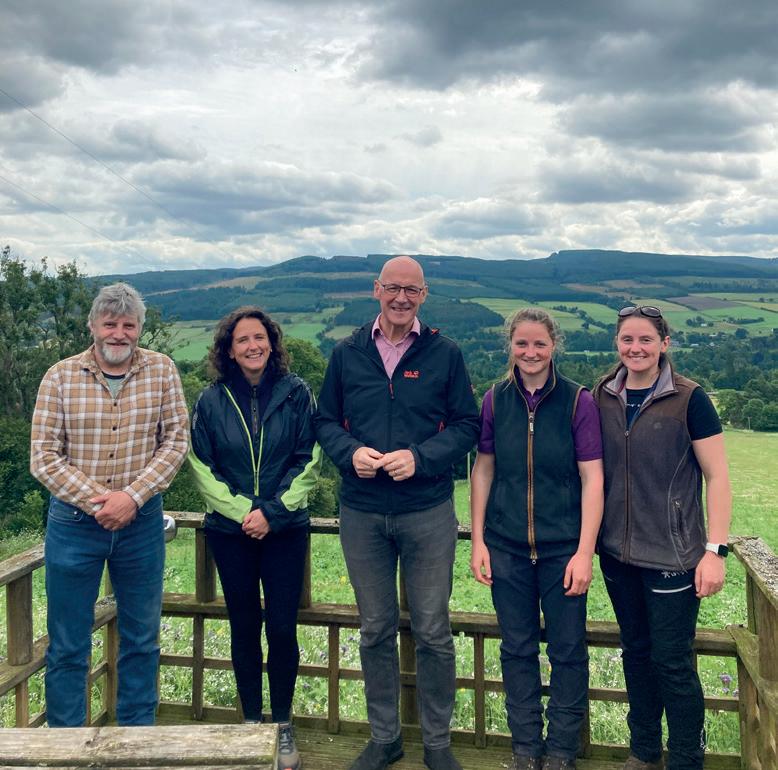

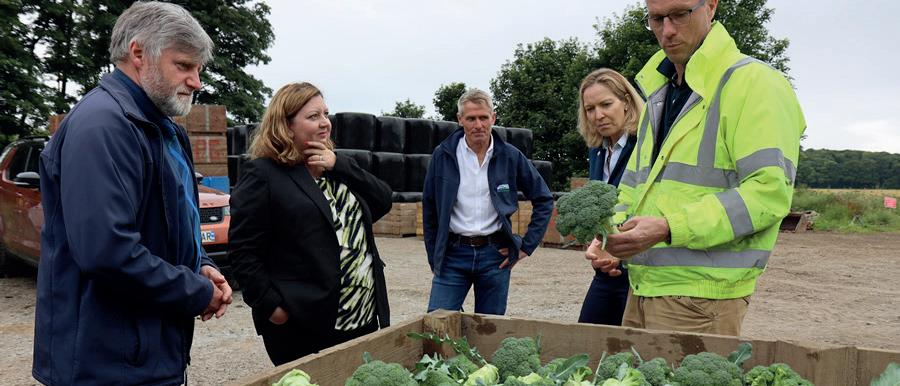
The newly appointed Parliamentary Under Secretary of State for the Scotland Offi ce, Kirsty McNeill MP, met with NFU Scotland on a Perthshire farm. During the meeting we discussed the need for a commitment to funding from the new UK Government, skilled labour issues and underlined the importance of farming to Scotland. We look forward to working with the Scotland Offi ce to ensure the needs of Scotland’s farming and crofting sector are understood, not only at the Scotland Offi ce, but across other Government departments including DEFRA, Treasury and the Home Offi ce.
Following the General Election, our team wasted no time meeting with the four main political parties at Westminster in July. With a lot of new faces representing Scotland in Westminster, this was a key opportunity to address the reserved issues impacting our devolved sector. Martin Kennedy, Andrew Connon and Jonnie Hall held meetings with several Scottish MPs to continue our close engagement. The team re-emphasised our request for commitment to an increased, ringfenced and multi-annual agriculture and rural development budget. They also underlined the need for at least an additional £1 billion, taking the UK total £4.7 billion, and the need for full review of the current allocations highlighting that Scotland’s share should be increased to better reflect our delivery on food, climate and biodiversity outcomes.
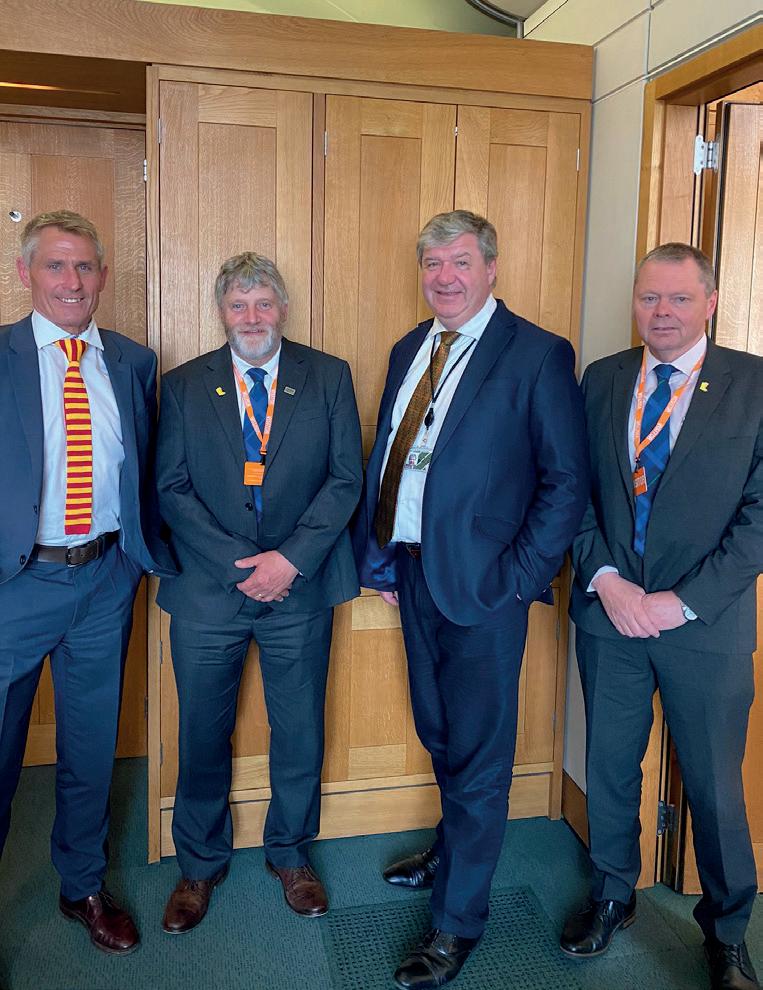
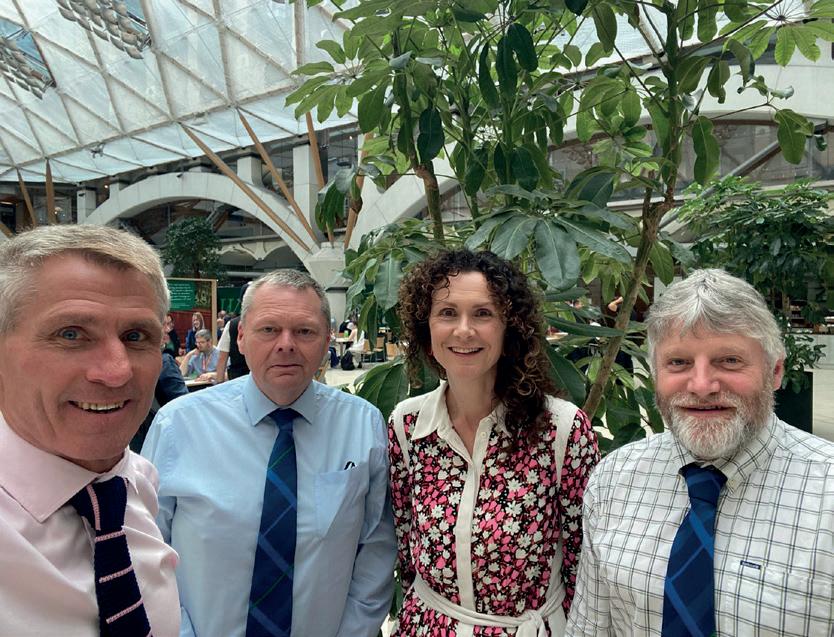
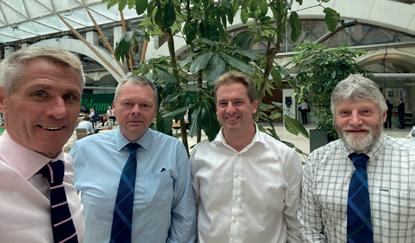
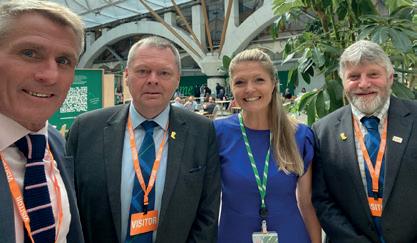
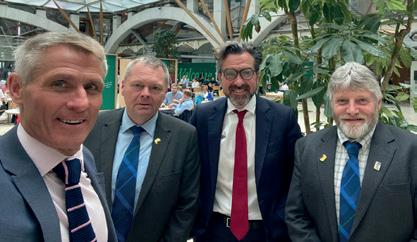
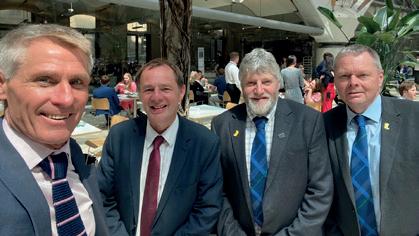
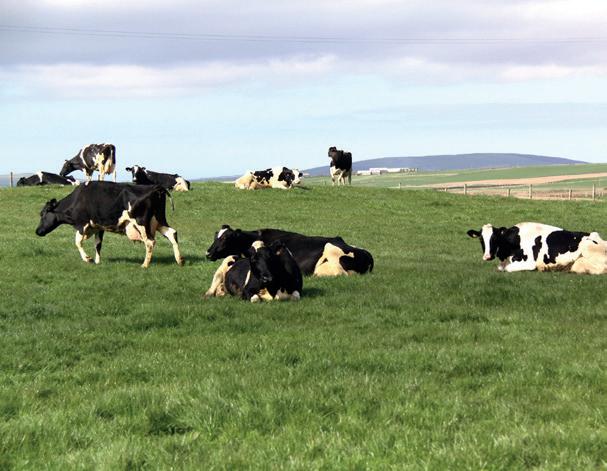


Tracey Roan Policy Manager
After more than a decade of NFU Scotland and other UK farming unions calling out unfair practices in the dairy supply chain, new legislation on dairy contracts has come into eff ect.
The new legislation called the “Fair Dealings Obligations (Milk) 2024” (FDOM24) came into force on 9 July. As a result of this, all new milk contracts made from 9 July 2024 need to be compliant with these regulations, while any existing contracts now have a 12 month transition period before they must comply with the new legislation before 9 July 2025.
It is hoped the new regulations will establish transparency and accountability across the dairy supply chain, stopping contract changes being imposed without agreements. There will also be a system in place to enable farmers to verify the calculation of variable prices. The new regulations include an enforcement regime, that will be processed via the Agricultural Supply Chain Adjudicator.
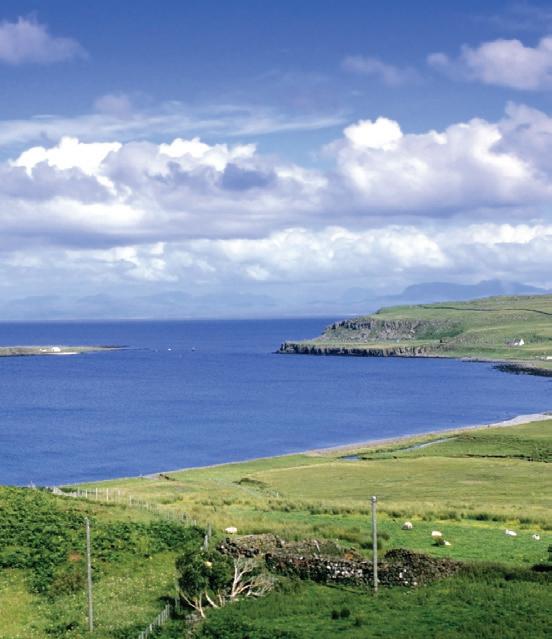
Coinciding with the new introduction of FDOM24, the Agricultural Supply Chain Adjudicator (ASCA) has launched a series of online webpages with guidance on lodging complaints. On these pages you can find:
• More information about the ASCA and office, including contact details, what a farmer/producer can complain to them about, and what happens if doing so.
• A complaints form that needs to be filled in and submitted to make a relevant complaint.
• Statutory Guidance on FDOM24 covering matters that will be taken into account when deciding any civil penalty or compensation payable if there has been a breach of the Regulations as well as rights to make representations during the complaints process, and the right to appeal to the Firsttier tribunal if the claimant is unhappy with the outcome of their complaint.
• Additional Guidance to FDOM24.
For more information scan this QR code.
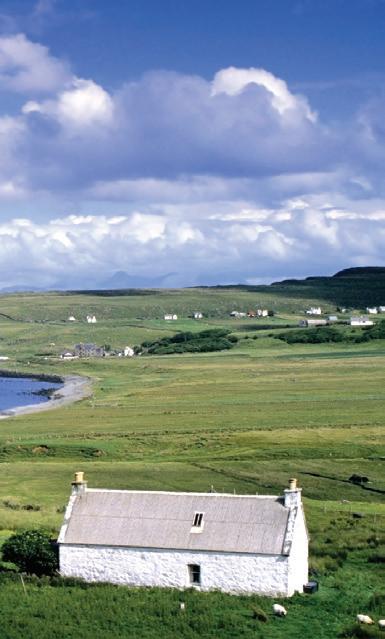




Rhianna Montgomery Policy Advisor
Our Crofting Highlands and Islands Committee has been working through the Scottish Governments Crofting Law Reform Consultation recently. The consultation proposes to make changes to joint tenancies, standard securities, use of common grazing and strengthening residency and land use as well as streamlining processes for the Crofting Commission.
We have held three briefi ng meetings for committee members, which were opened up to




Lucy McGillivray Policy Assistant
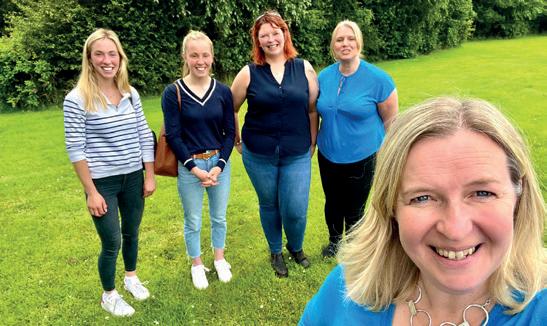
Over the past few months, Caroline Millar has been researching how NFUS can improve inclusion, diversity and engagement. This came after the Board of Directors made it a priority for the Union at the start of 2024, hoping to reform its practice by the end of this year. I have been the staff support and have thoroughly enjoyed working with Caroline on this important piece of work.
As part of the research, we launched a survey, interviewed external organisations, and conducted open meetings and focus groups to understand how NFU Scotland can engage with and represent everyone contributing
to Scotland’s agriculture sector. This is why back in July, Caroline Millar and I embarked on the Diversity Discussion Roadshow and spent a week travelling to all NFUS regions.
We started off the week in Kinross, then onto Stirling, Dumfries, Kilmarnock, Oban, Dingwall, Kinellar, Shetland, before finishing off the week in Orkney. Last but not least, we then visited Lothian and Borders a couple of weeks later.
Over the course of the week, we had some insightful conversations with people from all walks of life. Key takeaways from the roadshow included: the importance of effective chairing in meetings, including making people
members in the crofting counties. These meetings provided a great starting point for members to get their heads around the proposals and sound out responses to questions. The meetings also provided greater detail to the crofting member survey.
The output from these meetings and the survey of members, will help to form our submission. It is anticipated that this initial consultation will be the fi rst step in the Bill process. The consultation closes on 2 September. The NFUS response will be available on the crofting section of the website.
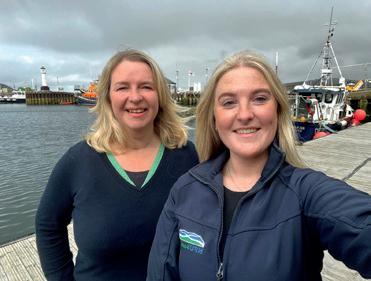
(especially new people) feel welcome; sticking to time; ensuring every voice is heard; and most importantly, calling out any inappropriate comments or language. Other key issues raised were use of language, and the importance of communication in achieving meaningful engagement.
Caroline has begun writing up the research findings into a report with recommendations that will be presented to Board in the Autumn. Diversity of thought is essential for any organisation and sector to thrive. That is why this piece of work was so important and will help to improve the Union’s engagement going forward.
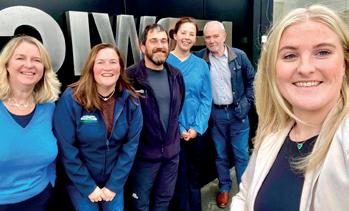
Compare and switch your ENERGY CONTRACTS in a few clicks!
NFU Energy’s brand-new energy price comparison tool is here! Giving you the freedom to compare and switch to energy suppliers offering more favourable deals tailored to your business’ needs.
•24/7 access
• Diverse range of one, two and three-year options for farmers and growers
•Potential to unlock significant savings
Compare and save today!


Scan the QR code belo w. Alternatively call 024 7669 888 0 or visit: quote.nfuenergy.co.uk/journey/supply-details





















































John Flanagan Senior Policy Manager
The Voluntary Initiative (VI) is an industry-led programme, set-up to promote the sustainable use of Plant Protection Products (PPPs). NFU Scotland has played an active role in the work of the VI. This is driven by our Combinable Crop Committee and operates on a UK basis, but also through a dedicated Scottish VI team.
There has been ongoing concern over loss of active substances due to ever-tightening regulations. This depleting toolbox of PPPs necessitates farmers to be active in protecting those still available. The VI looks to promote tools and messages which champion responsible use of PPPs through an Integrated Pest Management (IPM) based approach to sustainable agriculture. This is even more pertinent given the forthcoming changes to the Scottish agricultural support schemes. From next year, in return for BPS payments, claimants must start carrying out plans and audits that are relevant to their enterprises, of which an IPM plan is one and will need to be renewed annually.
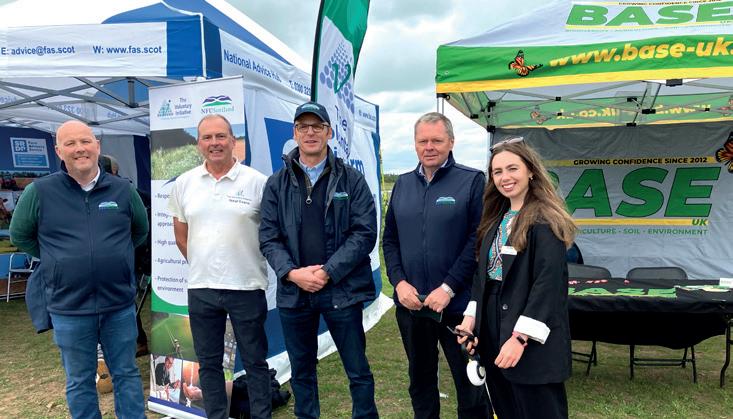
The Current VI promotion activity is centered around:
Integrated Pest Management (IPM)
• By giving you a simple tool to baseline your farming practices and track the impact of changes.
Minimising the risks of PPPs to surface and ground water
• By promoting Operator Best Practice for Water Protection
Minimising risks and impacts of PPPs to wildlife
• Through its various best practice guides available on the VI website: voluntaryinitiative.org.uk
Training and Education
• Through the National Register of Sprayer Operators (NRoSO).




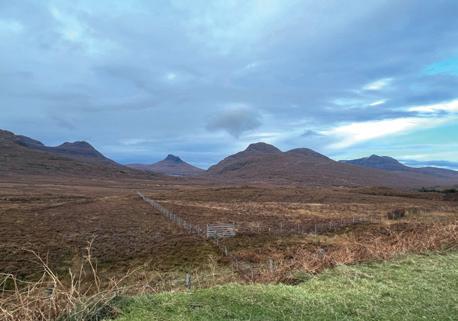
AThe VI attended ScotSheep 2024 with Farming & Water Scotland, AHDB Strategic Cereal Arable Farm and Arable Scotland in conjunction with SRUC and JHI partners. The team also have plans to attend AgriScot later this year, again with Farming & Water Scotland. In Scotland, we have plans to augment activity through our Scottish VI Champion network and through collaboration with local water catchment groups, SRUC, the Farm Advisory Scheme (FAS) and SEPA. The Scottish Chair is Amy Geddes, and her main driver is to bring positive changes for the industry by being proactive and having a collaborative approach.
Come along and see us at a show or contact us directly or visit the VI website: voluntaryinitiative.org.uk.
t the time of writing, we have had a spell of four dry days, a pleasant change from the mixed weather we’ve had until now. Winter barley harvest is progressing but looking round the country some spring crops look a long way off. Let’s hope the good weather continues.
I had the opportunity to pop into the fi rst store lamb sale at United Auctions in Stirling, where the mood was buoyant to say the least. Lambs selling at rates between £13 and £20 up on the year, show a fair bit of confi dence in the sector. If that knocks into breeding sheep sales, then for a young person trying to get started the road becomes
even more diffi cult. Joint venture opportunities can help provide that path. There are plenty of good young people around seeking that elusive opportunity, we just need more opportunities coming forward. Having said that, we have seen an increase over the last few months in people coming forward with opportunities to off er and we are working hard to fi nd matches for them.
I had a really positive meeting with Alix Ritchie from Farmstrong Scotland recently and look forward to being able to support them in the important work they are doing. It costs nothing to talk and if we can play a small part in helping, we are only too pleased to do that.




Penny Middleton Policy Manager




BLisa Hislop Policy Advisor
oth UK Government and the European Union have made commitments to ensure supply chains are not contributing to world deforestation. While the aspirations of each legislation are similar there are some differences, both are clouded in ambiguity and uncertainty on how they will work in practise.
The EU legislation, due to be implemented at the end of 2024, will introduce a mandatory requirement for businesses to demonstrate due diligence
and ensure commodity products do not originate from land deforested since 2020. It covers six commodities entering the EU Market: beef, soy, timber, coffee, cocoa, palm oil and rubber.
There will be a requirement to prove that any of the commodities, notably beef or soya, sold on the EU single market, including NI, cannot come from land that was clear to make space for cattle grazing or soya production.
It has been suggested a benchmarking system could rank individual countries risk of deforestation, however this has not yet been established. It is important to note that while there won’t be an exemption or ban for any country, each company exporting to the EU single market will be required to demonstrate due diligence. It has been proposed that a satellite monitoring tools or field audits could be used.
UK Forestry Risk Commodity (UKFRC) has similar nuances, only businesses
with a turnover of over £50 million will be required to report. However, it also goes further by extending to embedded products, meaning any animal cannot be fed soy from deforested land, leading retailers to require producers to demonstrate they have only used compliant soya. UK retailers have made commitments to being EU Deforestation Regulation (EUDR) compliant by the end of the year and are calling for the UK Government to produce the UK legislation, mirroring the EUDR as much as possible. We know that this will become a significant burden for all livestock product’s supply chains.
The development of the UK’s legislation has been severely delayed in light of the political context, but delays are causing uncertainty for businesses in the UK. We continue to engage with fellow industry stakeholders and officials to underline the practicalities and unintended consequences.
In light of the aforementioned legislation, particularly UKFRC, our Pigs Working Group visited Glasgow docks, where soya comes into the country. This was to allow us to better understand some of the challenges facing soya importers in sourcing soya with compliant chains of custody and guaranteeing full segregation of products. The visit was hosted by Peel Ports and ADM Animal Nutrition who explained the diffi culties they face with uncertainty and the prospect of two diff erent compliance systems. We saw the process of unloading boats and storing the huge quantities of product and how diffi cult it will be to maintain and guarantee segregation.
The only thing clear right now is that there will be compliance premium on soya. However without clarity around the regulations, no one is willing to
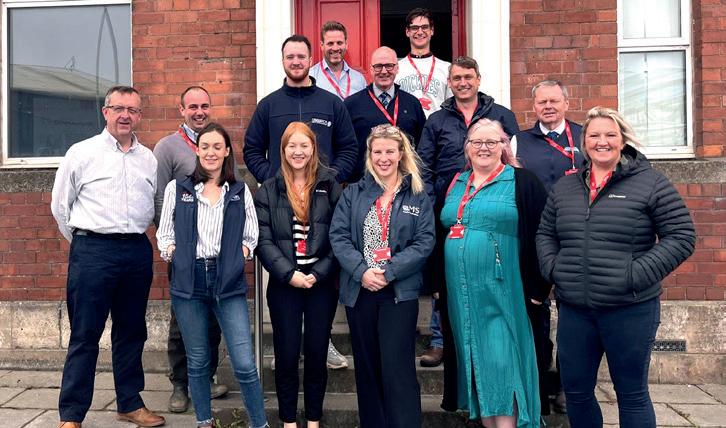
provide a price until they know what that extra cost will be. So far, estimates have varied from a £50-100+/tonne premium. We’re is working with industry and AIC
in urging government to provide much needed clarity.
Our thanks to Peel Ports and ADM for hosting this fascinating trip.
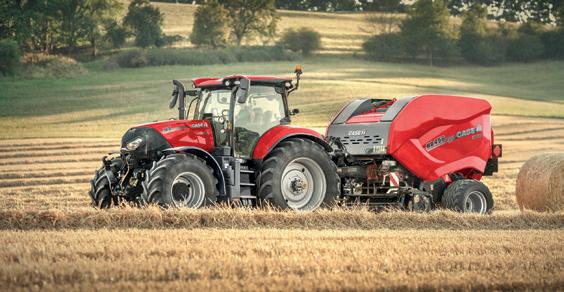

















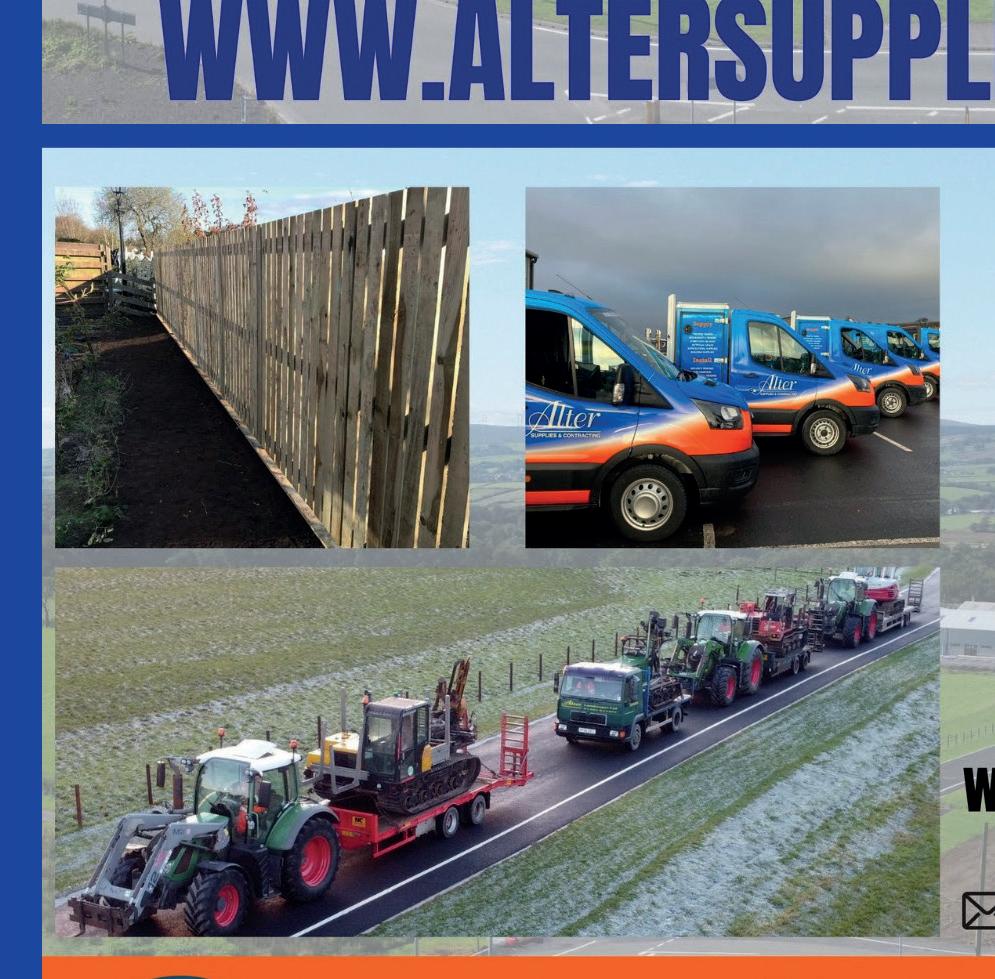



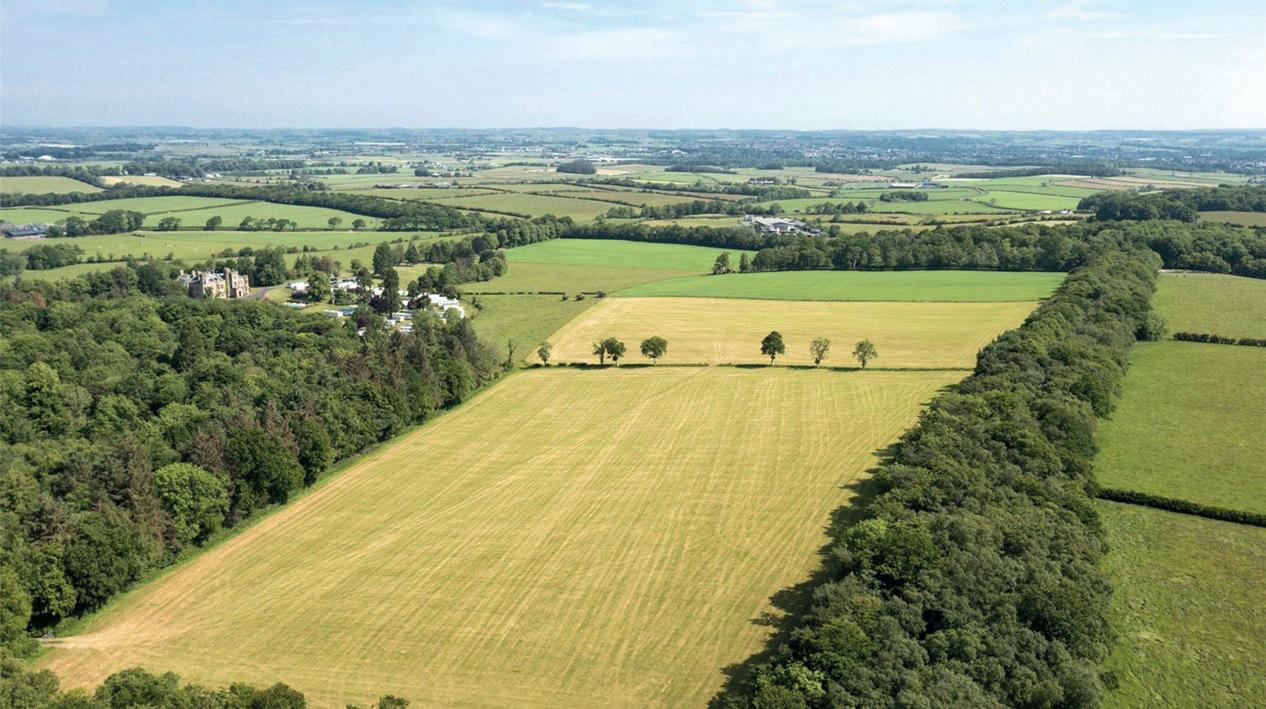


Sarah Cowie Policy Manager
ollowing a nomination period which closed back in February, Galloway has now been confi rmed as the proposed location for Scotland’s next National Park. This will be of huge concern to many of our members in that area. It’s important however to note that the process is far from complete.
NatureScot will now conduct a twelve-week public consultation (expected to run from November 2024 to January 2025), before submitting its fi ndings to ministers by 28 April 2025. After that, ministers will consider the fi ndings before making a fi nal decision on Galloway’s National Park status. If they are in favour of the proposal going ahead, it could result in secondary legislation being developed. This will then need to be consulted on and
approved by the Scottish Parliament. We will continue to oppose this proposal for Galloway to become a new National Park, but we will remain engaged with the process.
We have been clear that NatureScot’s engagement during the pre-consultation phase (August to November) and the formal consultation period must be open, inclusive and transparent. Farmers and land managers must be consulted on all aspects of the proposal and their views, interests and concerns must be taken into account.
We feel strongly that agriculture and food production, and what farming businesses deliver to the rural economy, must be central to any future decision about a possible Galloway National Park. It is clear for many of our members, existing parks have failed to make a positive contribution to farming and crofting. Throughout this engagement and consultation period, we will ensure that the vital contribution farming and crofting makes to this area, and Scotland as a whole, can continue without the excessive bureaucracy that National Park status may bring.
The Scottish Government has said that any new National Park should:
• Support economic growth.
• Address the climate emergency.
• Improve public services and community wellbeing.








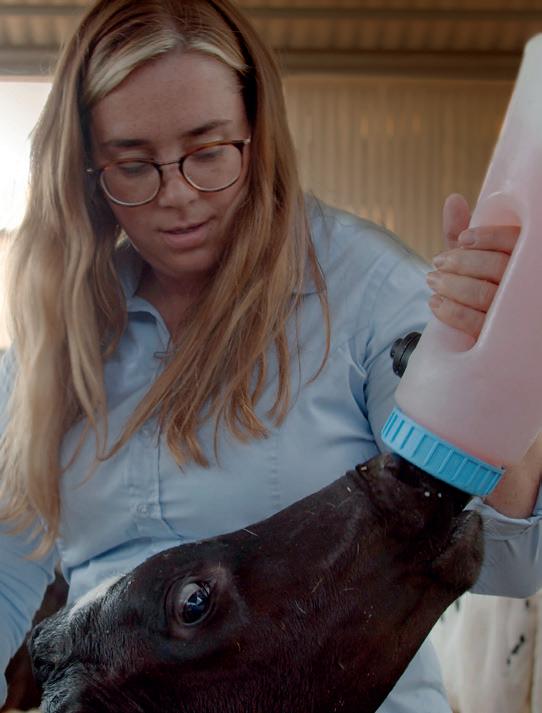

















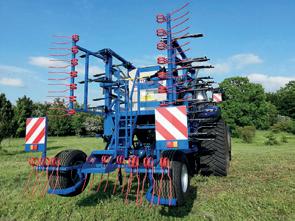





Jonnie Hall Director of Policy

be a priority for new
Leading up to the General Election in July, our top priority for a new UK Government was an unequivocal commitment to an increased, ring-fenced agricultural support budget over the lifetime of the parliament to come. As set out in our Manifesto published in April, the explicit request for an additional £1 billion per year, at least, was also backed by calls for a comprehensive review of how UK farm funding should be allocated across the devolved administrations. Given that Scotland punches well above its weight on today’s policy objectives around food, climate, nature and rural communities, it’s more than necessary.
With the new Labour Government fi nding its feet in Westminster, it’s more important than ever that we continue setting the cast iron case for more support funding across the UK. We also strive for Scotland’s share to increase beyond the historic 17 percent. That task may have become signifi cantly more challenging, with Chancellor Rachel Reeves setting out a £22 billion public spending “black hole” as she manages expectations ahead of the new Government’s fi rst budget on 30 October. Nevertheless, that must not deter us from our primary goal.
There is also clear rhetoric coming from the new UK Government that “food security is national security”. These lines have been repeated often. In turn,
we are playing these same lines back to new ministers across Defra, the UK Treasury and the Scotland Offi ce, as well as to the cohort of new Scottish MPs.
We fully agree that food security is national security. However, maintaining both the availability and aff ordability of high-quality food for consumers across
employs over 67,000 people, making it the mainstay of most rural communities. As the fi rst and critical link, agricultural production then provides the seed corn for approximately £16 billion of output from the Scottish food and drinks sector, securing over 320,000 jobs in doing so.
There is also clear rhetoric coming from the new UK Government that ‘food security is national security’
the UK continues to rely on direct agricultural support payments. Farmers, crofters and growers across the UK are also increasingly tasked with delivering food production with the responsibility of doing so in ways that help meet climate and nature goals.
With the UK Government’s budget on the near horizon, and spending reviews to follow, now is the time to make our views very clear, and very clearly heard.
Let’s start with the fact that Scottish agriculture generates a gross annual output of over £3.3 billion and directly
Future farm support funding remains vital for food security and economic growth in the UK, not least in Scotland. In addition, any real or nominal reduction in future funding would undermine the array of upstream businesses relying on the spending of active farming and crofting. The socioeconomic multipliers critical to wider rural prosperity across Scotland, would therefore, be at risk.
Being blunt, without adequate funding from the UK Treasury any ambitions in relation to high-quality
food production, tackling climate change, nature restoration and thriving rural communities will not be delivered and many farms and crofts across Scotland would cease to be viable. This would lead to signifi cant socio-economic and environmental challenges. While this is not unique to Scotland, it would be of greater threat and greater consequences.
Despite the ring-fenced, multiannual commitment to funding for UK agriculture from the previous UK Government, there was also signifi cant erosion in the value of current support while farmers and crofters were tasked with more policy objectives. Hence our call for at least an extra £1 billion, from £3.7 billion to at least £4.7 billion. On current allocations, that would mean at least an extra £170 million for Scotland, given our current share is 17 percent. That share however relates back to the distribution of funding almost entirely based on expenditure under production-related schemes between 2000 and 2002.
After decades of “decoupled” support, and a complete shift in the objectives of supporting farming and crofting policy, we fi rmly believe there should now also be an overhaul of the allocation of funding across the UK.
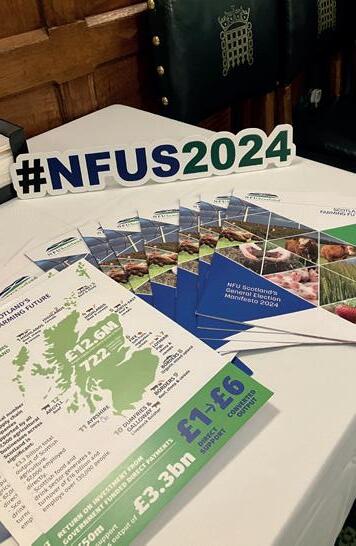
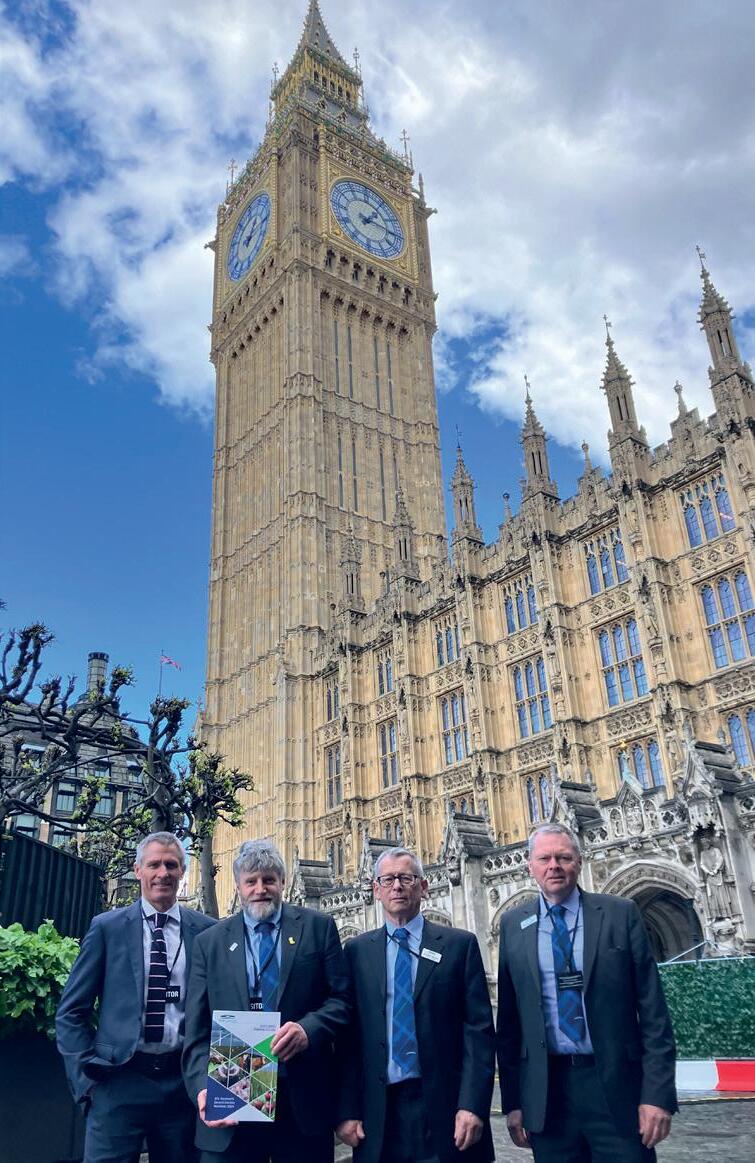
We’re also not alone, the Bew Review in 2019 recommended funding should be increasingly prioritised in line with addressing environmental challenges including climate change, whilst also recognising the social value of farming and sustainable food production.
Given current and future agricultural policy across the UK has a much greater focus on delivering environmental and social outcomes, as well as food production there is a valid argument for a greater share of future funding to be allocated to where in the UK these outcomes can best be delivered. Scotland punches well above its weight on all of these.
Scottish farmers and crofters are uniquely placed within the UK to deliver on the outcomes required.
We need the new UK Government to ensure the needs of Scotland’s farmers and crofters are understood, particularly in relation to securing funding for the sector. If food security is national security, then committing to sustainable agricultural production in the UK will be critical.
On 1 August, the Secretary of State for Defra Steve Reed MP said: “The new Government will restore stability and confidence in the sector introducing a new deal for farmers to boost rural economic growth and strengthen food security alongside nature’s recovery.” This must be backed with actions, starting with the funding commitment clearly required. Anything less will fail so much more than UK and Scottish agriculture.
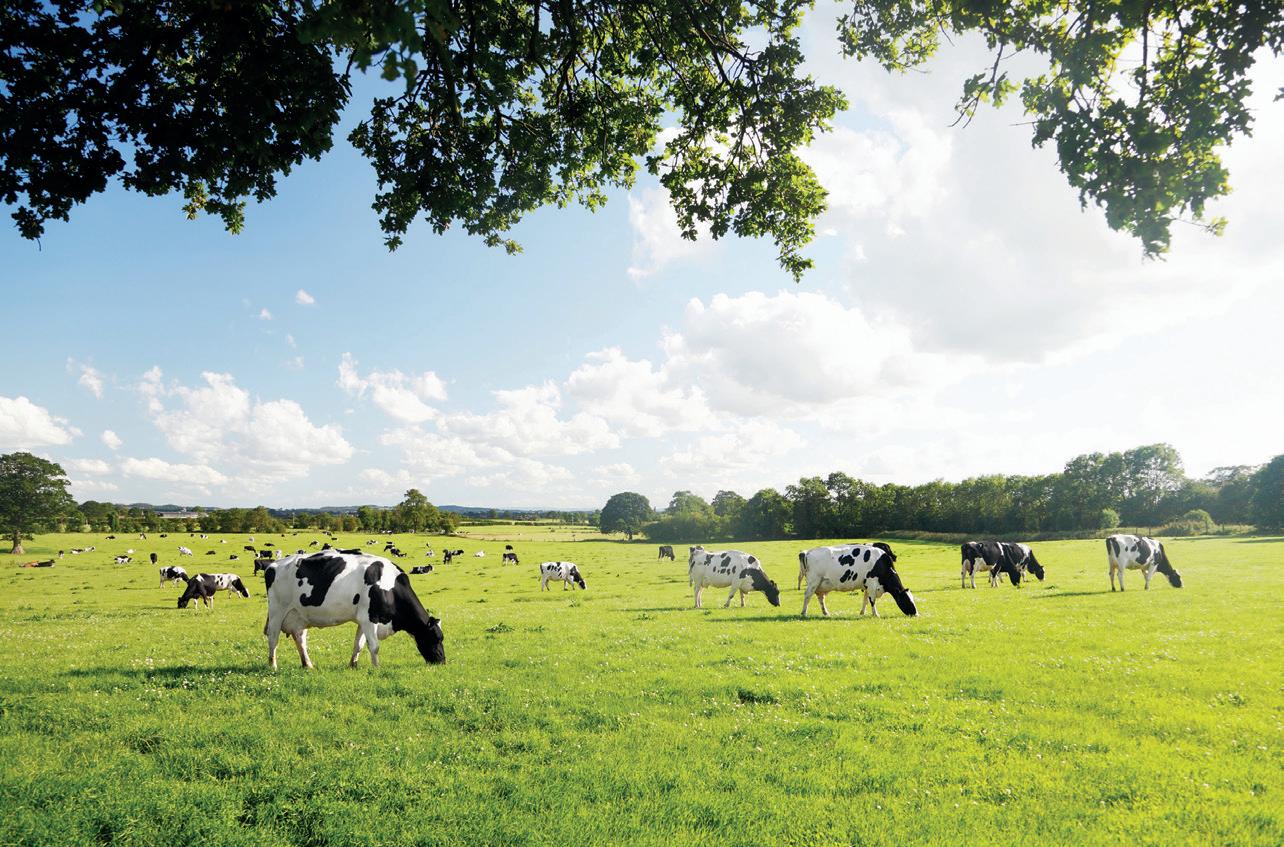

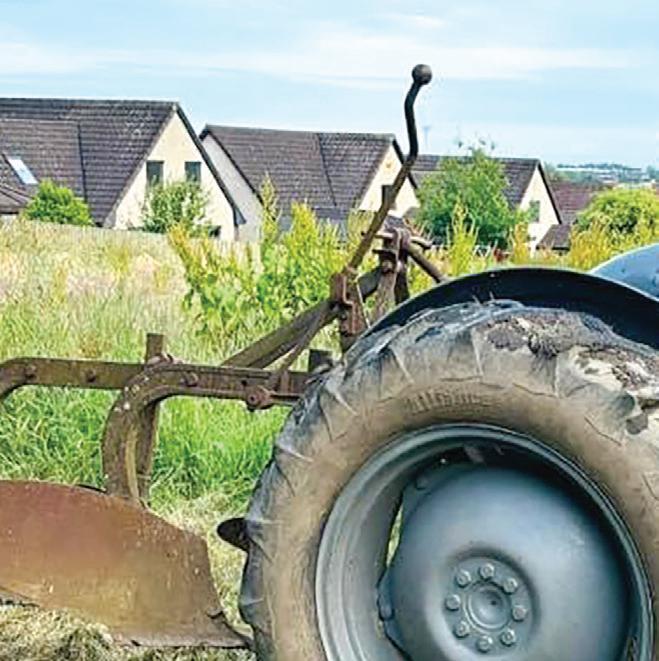
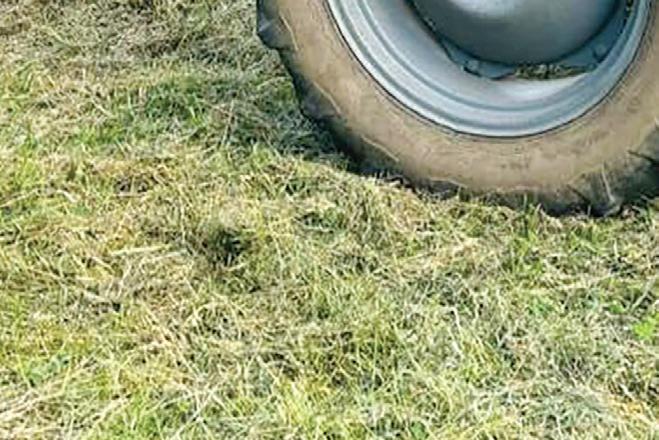

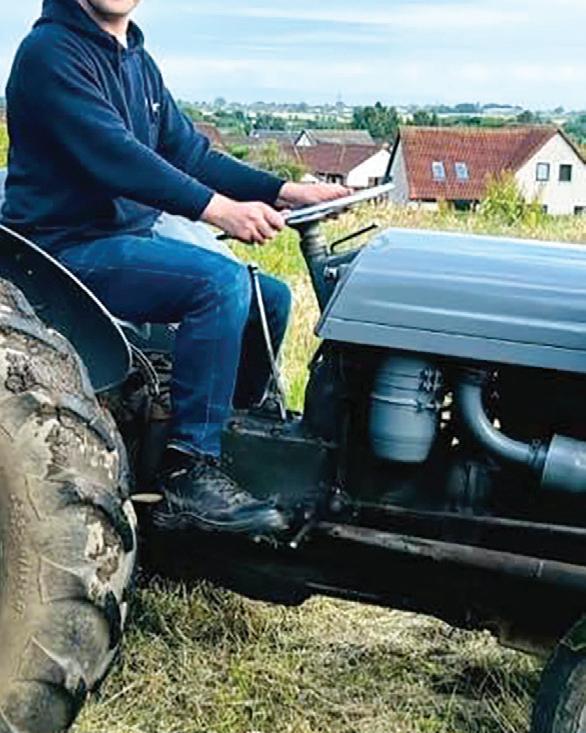
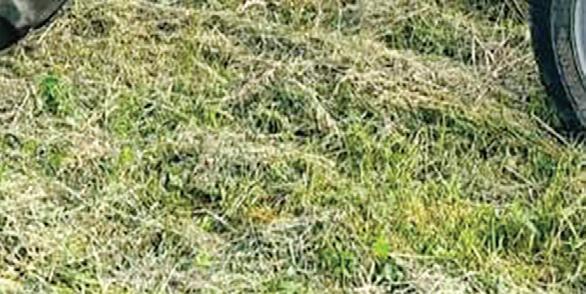

“Iam proud to be autistic, proud to be an outsider,” were the words David Nicholson set his life to.
After being diagnosed with autism at age 18, he was determined to prevent the condition becoming a barrier to a successful career. Now at age 35, the Fife-born professional fi ddle player and neurodiversity campaigner, owes his resilience, work ethic and determination to Scottish Agriculture.

“I love going to shows and agricultural events, it’s really helped my confi dence over the years to feel part of something.
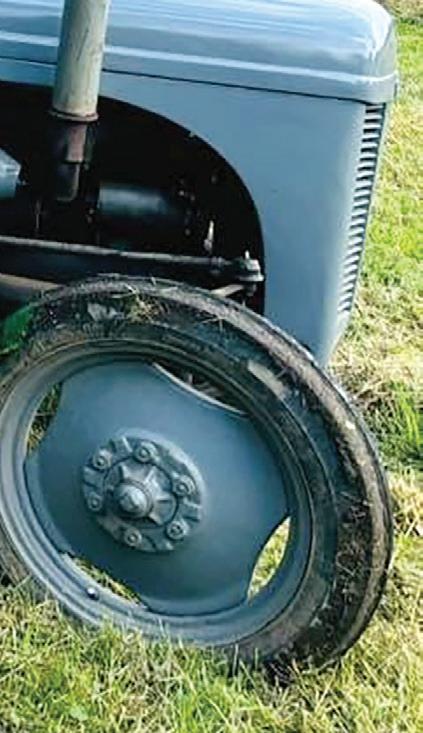
“The countryside defi nes who I am” said David, while proudly wearing his Bell Baxter Young Farmers tie. He grew up on his family smallholding near Glenrothes, which he still helps out on in his free time. “Nothing gives me greater joy than helping my dad on the smallholding. It’s always been where I go when I feel I need to get away from it all, make memories and spend time with family,” he added.
“I owe a lot of who I am today to my rural roots. Things like resilience, determination and just getting on with it, I all learned from agriculture. Without that upbringing, I doubt I’d be where I am today.”
While the world’s understanding of learning diffi culties constantly evolves, agriculture has remained proudly welcoming of neurodiversity (neurodiverse being the non-medical umbrella term to describe individuals with diff ering mental functioning than the majority). Recent research
I owe a lot of who I am today to my rural roots. Things like resilience, determination and just getting on with it, I all learned from agriculture. Without that upbringing, I doubt I’d be where I am today.
Now working for the National Autistic Society Scotland, David recalled showing signs of autism in his early teenage years. Feeling confi dent in social settings was hugely challenging for him growing up, perhaps a surprising backstory for a successful live musician and public speaker. He found it diffi cult to form relationships with classmates at school and confi ded instead with the family Clydesdale horse, Ally (pictured right). “He was a huge part of my life and was a big friend to me in diffi cult times growing up,” he said, “if there was anything troubling me at school, I was able to come home and spend some time in his company. It made a huge diff erence.”
As socialising continued to be a diffi culty in David’s life, agriculture provided the constant community he needed to feel included. He recalled:
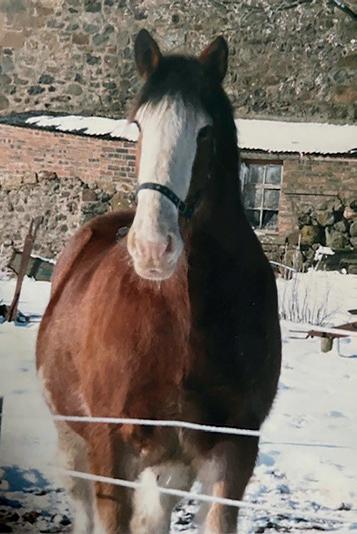
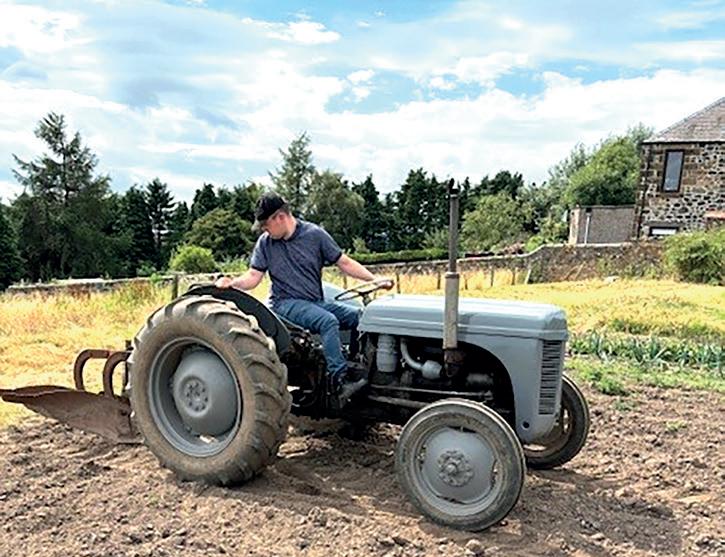
suggests 30% of UK rural workers have neurodivergent processing, most commonly dyslexia and autism. When only three in ten UK autistic adults are employed, this sector has always been a place for individuals to strive beyond incredibly unfair expectations.
“We need to get better at embracing autism, neurodiversity and difference,” David said during an address to the Civil Service Neurodiversity Group in January, “there is still too much talent not being recognised by employers in this country and too much talent is sadly going to waste.” He was invited to speak to the group by the National Autistic Society Scotland, in the hope his emotive dialogue encouraged them to increase neurodiversity support.
A passion for politics, encouraging change and understanding of neurodiversity has been the fuel for David’s career following his autism diagnosis. Since leaving the University of Stirling with a degree in Law and Politics, David has been involved in neurodiversity campaigning at local and national levels with particular links to the farming sector. Throughout
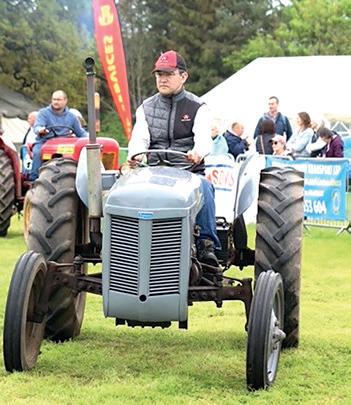
his work, he stressed the value of education as a method to allow a more inclusive society.
He said: “By building awareness of what autism and neurodiversity is, you can build a much better support network.
“To me, agriculture is a wonderful industry with a lot of neurodiverse people. There might even be people in the industry who are neurodiverse and don’t even know it, so it’s really important we have that awareness and understanding.”
Having been a member of NFU Scotland for many years, David would like to champion neurodiversity awareness in the Union. Previously, anxiety in social settings discouraged him from attending regional meetings and limited his involvement in NFUS. However, as he has grown older, his confidence has grown. Last month, David attended the Union’s Diversity Discussion in Kinross to share his experience and fundamental needs with the team.
“The focus group with Caroline and Lucy in Kinross gave me hope that
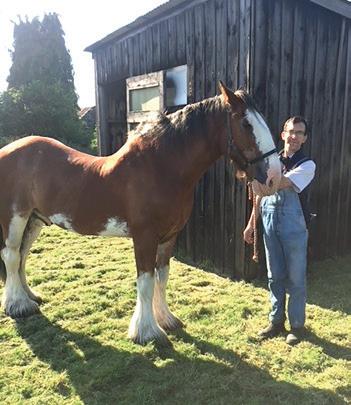

this is the start of a conversation in the Union and beyond about support for neurodiversity,” he said, “for me, a lot of the time I want to get to know people but sometimes it’s just a bit much. When I’m around smaller group of people that I can trust, that’s when I let my hair down.
“I can certainly have a few to drink, I’ve been drunk on a few occasions,” he added laughingly.
NFU Scotland made diversity and inclusion priority for 2024. VicePresident Alasdair Macnab championed improved support for the agricultural neurodiverse community throughout his career. Having dyscalculia himself, he shows what is possible for individuals with learning difficulties not only in farming but also in veterinary medicine.
“It’s all about getting through my life with coping mechanisms,” Alasdair said, “as a vet, I actually had a book with all aesthetic doses written down, so I didn’t need to work it out every time.
“As a farmer, the biggest issue I had was reading ear tags. I could read the number out loud but the difficulty for me, was writing it down. The way I overcame that was getting someone to come out with me and write the numbers down while I read them out.”
Alasdair valued the importance of being open with his numerical struggles as he rose through the ranks of NFU Scotland. He recently collaborated with the Farm Advisory Service on a neurodiversity documentary, where he encouraged others in the sector to not let a diagnosis “rule your life”.
This sentiment has been at the core of David’s drive in his personal life and his successful career as a musician and campaigner. From starting as a shy, Fife country boy whose greatest challenge was social confidence, to performing live at this year’s Edinburgh Fringe Festival, his career has shown the best of neurodiverse determination.
Feeling slightly emotional in his reflection, he added: “Whilst I might be different, being autistic’s not going to stop me from getting on in life and achieving everything I want to achieve. I’m proud of my differences and proud to do things in my own, unique way.
“So absolutely, I’m proud to be autistic.”




























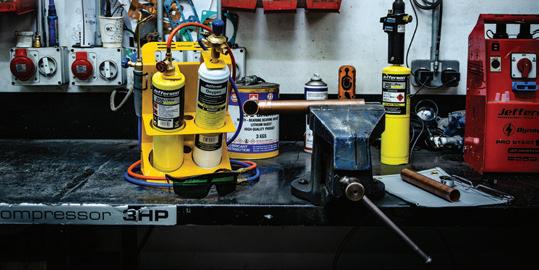






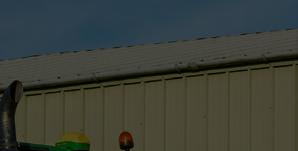
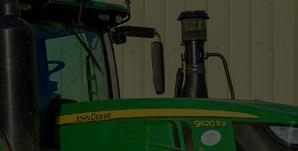

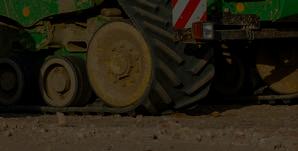



HIGHLAND




REGIONAL MANAGER
Ian Wilson
07775 915 988
ian.wilson @nfus.org.uk
As always anything that you think NFU Scotland can be of assistance to you please get in touch.
NFUS Highland region has had a busy summer of shows where we spent time, as always, doing our best to educate political leaders. With us only having one returning MP following the General Election, this was a slight challenge. However, it was an opportunity to build strong relationships with the new MPs when they are just in the door and keen to listen and learn.
Our Regional Board Summer Meeting was held in Grantown, in the offi ces of the Cairngorm National Park Authority (CNPA). This was a good venue for us to get an update on Park farming and crofting activity from Head of Land Management Colin MacLean. A good open discussion was held on how the Park could do more to help farmers and crofters, and the benefi ts of working together better. We did have areas of disagreement but it wasn’t all bad. With MINS branch, we had a joint Farmwalk at Rory and Emma Baikie’s farm in Carrbridge. We
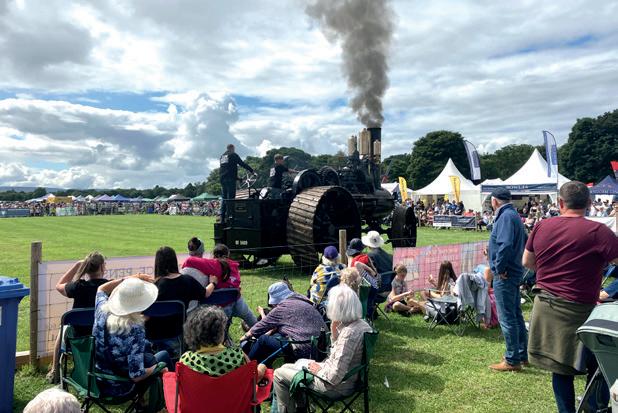
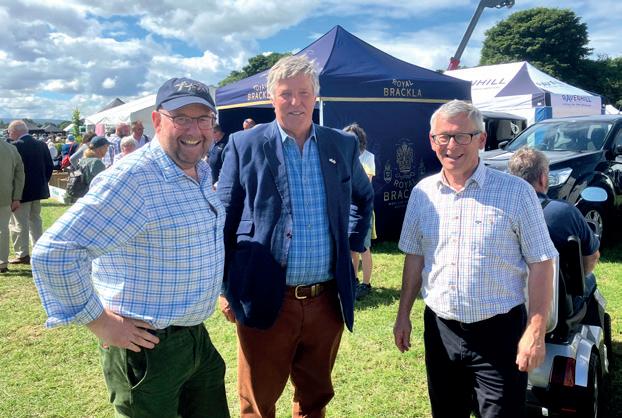
saw some excellent cattle, crops and river fl oodbanks on which we discussed on the potential damages beavers could cause. With the recent release by CNPA, our members have lost faith in the Park, despite its promise of increased mitigation measures that took account of any damage to agricultural production. With President Martin Kennedy in attendance at the Farmwalk, we had some excellent discussion on the current Union workload
and what we are doing to address coming issues for our members. Hopefully the few invited nonmembers that attended will also see the value and sign on the membership dotted-line.
Our Group secretaries and their staff are busy taking every opportunity to increase Union membership. If any of you know of non-members we should be targeting for this, please pass on the details to local offi ces or myself.
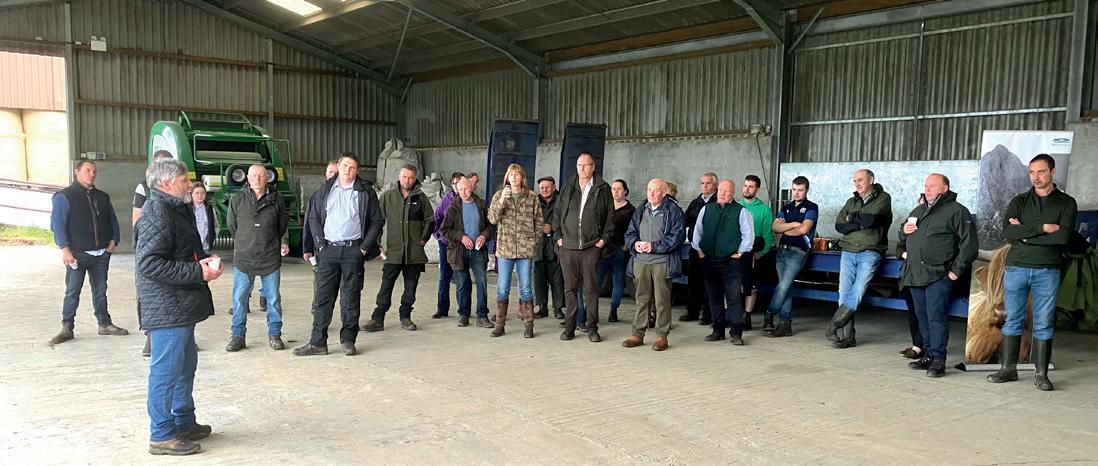
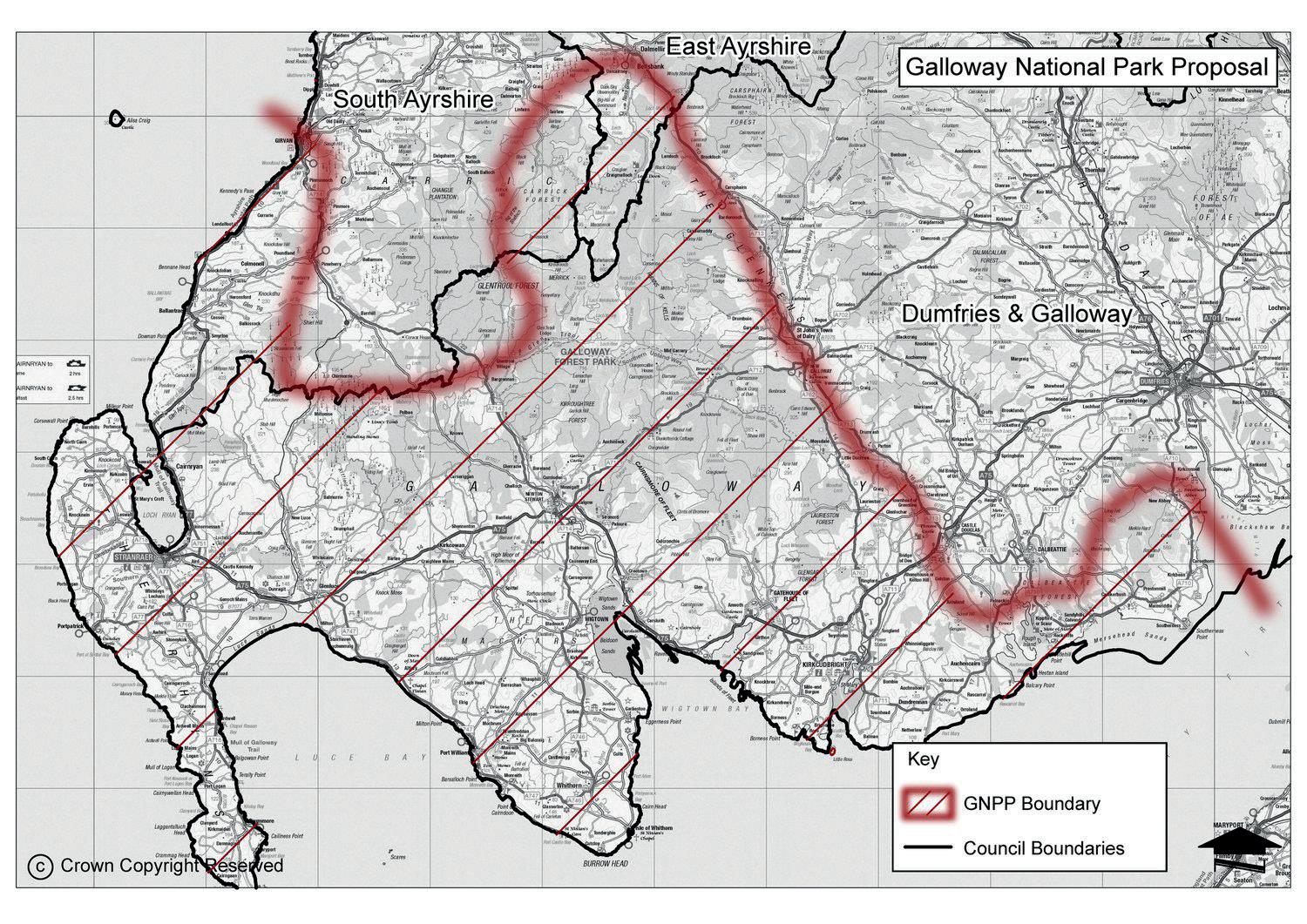
AYRSHIRE




REGIONAL MANAGER
Mhairi
Dawson
07718 425 053
mhairi.dawson @nfus.org.uk




REGIONAL MANAGER
Sheena Foster
07789 796 582
sheena.foster @nfus.org.uk
At the time of writing, Scottish Government has just announced Galloway as their preferred bid for Scotland’s next National Park. Members in South and East Ayrshire should know that there are areas of Ayrshire within the boundary. A consultation process will be run by
NatureScot over the coming month and we will keep you informed.
Please see the bid here: www.gallowaynationalpark.org/bid and please fill out our NFUS Scotland survey here if you are in or next to the boundary: www.surveymonkey.com/r/Q3RJT82


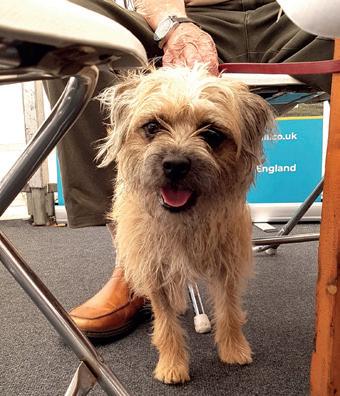




07780 441 750
lindsay.brown
@nfus.org.uk
Kelso Show was a very busy day with lots of members dropping in for some refreshments and a seat at our stand. Things got particularly busy when a few rogue showers passed through on Saturday and we were bursting at the seams. President Martin Kennedy was at Kelso both days having been on the panel for the RSA Business Breakfast.
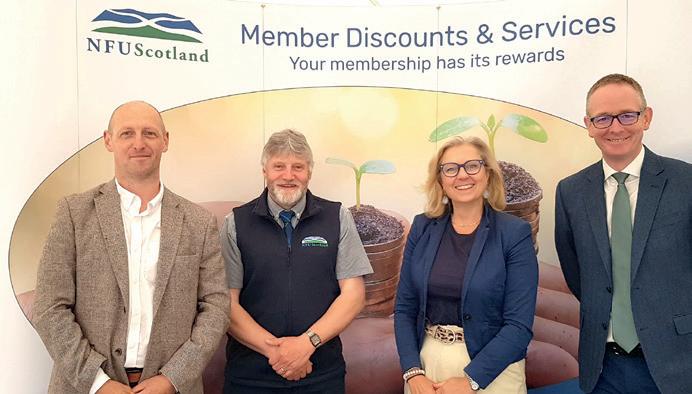
As always, we had good engagement with politicians Emma Harper MSP, Craig Hoy MSP, Rachel Hamilton MSP and John Lamont MP. All of whom visited us with the opportunity to discuss national and local issues affecting farmers across the Lothians and Borders.
On Friday night Kelso and St Boswells branch held a social event for branch members. Then on Saturday, Martin and NFU Scotland CEO John Davidson were available to engage with members.
MSP for Midlothian North and Musselburgh, Colin Beattie, was keen to find out more about the agricultural sector in his area. Ben McClymont, Next Generation Chair, welcomed him on farm to discuss the agricultural sector’s importance to Scotland’s wider economy as well as the need for a willing workforce and how to bring new people into the sector. Agriculture has to be an industry which young people are attracted to come into with a secure future. Mr Beattie learned a lot.
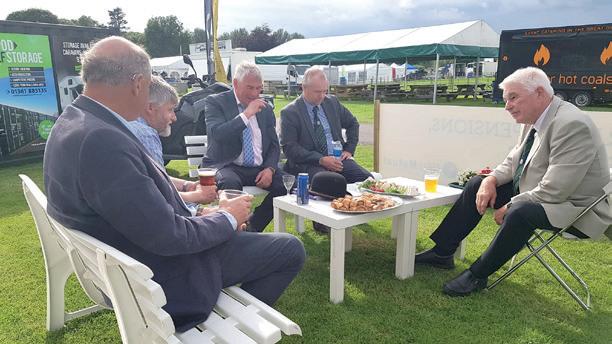
This year’s summer BBQ and Farm Tour was hosted at Bee Edge Farm, Coldingham, by Will Hamilton and his daughter Annabel. We had a super turnout of members. Alix Ritchie gave a short introduction to Farmstrong and why we should all be mindful of our mental wellbeing. Will and Annabel then introduced us to the farm while explaining the importance of succession in their business and how they have expanded with long-term growth being the ultimate goal. We were loaded into trailers for a tour round some of the fields, with a strong focus on the value of applying muck on fields to improve soil fertility to maximizing yields. Will is the Limousin cattle man buying quality stores and is renowned for selling quality prime stock to regular butchers. We had a fantastic night in the most beautiful location with perfect weather.









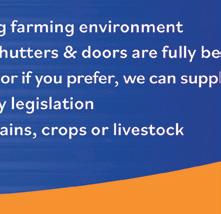






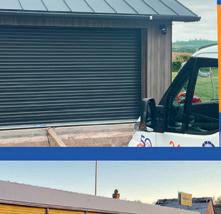

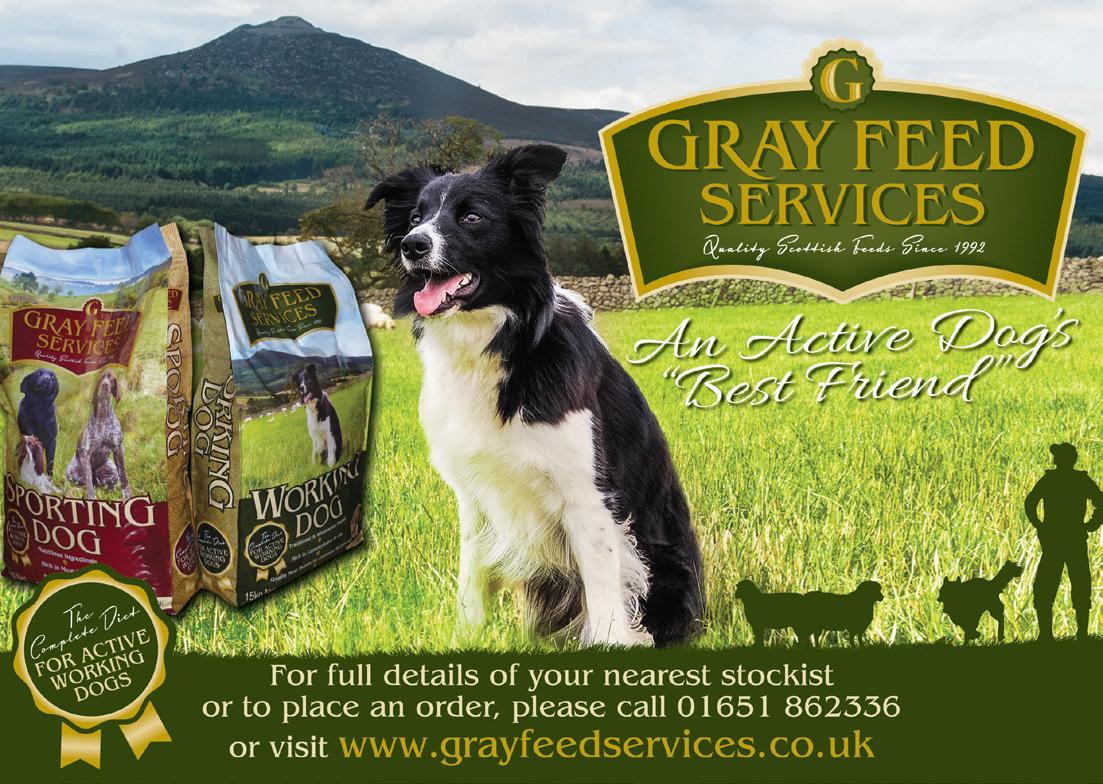
DUMFRIES & GALLOWAY




REGIONAL MANAGER Mhairi Dawson
07718 425 053 mhairi.dawson @nfus.org.uk

From toddlers to thirtysomethings, welcoming, educating and encouraging the future generations of Scottish farmers remains a priority for NFUS D&G. Many of our members contribute to this frequently through many diff erent ways in the hope that we impact as many people as possible:
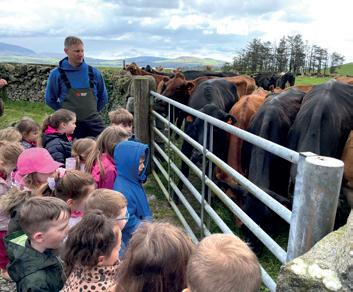
ARGYLL AND ISLANDS


REGIONAL MANAGER Lucy Sumsion
07787 434 104 lucy.sumsion @nfus.org.uk
• Farm visits arranged through RHET D&G are a common occurrence to engage with the little ones and with their teachers, who often get as much out of it as pupils! Some of the schools who benefi tted from this in recent months are Noblehill Primary School from Dumfries, who went to see Angus Kerr at Crochmore. They learned about dairy farming and were able to get hands-on experience feeding calves and lambs. Glenluce Primary School were able to see the modern, clever technology involved in dairy farming at Kirvennie, courtesy of Graham Armstrong. Loreburn Primary School, Dumfries, went to see the Jamieson family at Upper Locharwoods to meet cows, calves and lambs, and a brandnew tractor supplied by a local dealer.
• With support and encouragement from Regional Vice -Chair Hamish Waugh, and other members, one
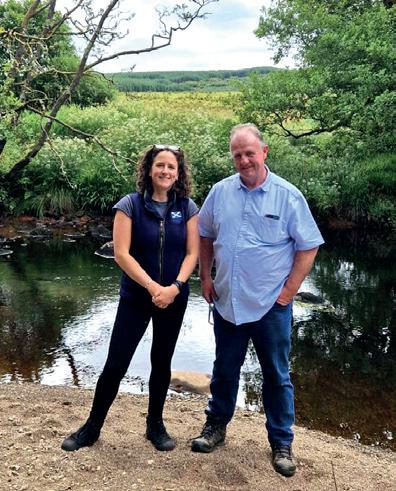
young farmer has applied for support and mentorship from the Henry Plumb foundation. This has helped him start a sheep fl ock on his family farm.
• Group Secretary Michael Goldie hosted the local Young Farmers Clubs at Stranraer and Wigtown shows. The groups joined us for a lunch while hearing about how we work and how the Wigtownshire branch could support them locally.
• We’re proud to announce that Tarff Valley has become a professional member of NFUS D&G! We look forward to working with the team and supporting the excellent work they do with apprenticeships and beyond.
As always, if you have an idea of a project, meeting, plan or otherwise that we could do to support the next generation, whatever their age or stage, please do let me know.
Cabinet Secretary for Rural Aff airs, Land Reform and Islands, Mairi Gougeon MSP recently visited Kintyre, where she met Regional Board Chair, Duncan Macalister. The meeting was organised by Jenni Minto MP for Argyll & Bute. Duncan and the Cabinet Secretary visited the Backs Water, near Campbeltown, where they discussed concerns around Controlled Activities Regulations (CAR) and SEPA licensing. They also discussed the Agri-Environment Climate Scheme (AECS) and applications relating to slurry storage. Duncan was able to outline some of the problems members have experienced in relation to single year funding and short timescales for applications, securing planning permission and submitting a claim.
The Cabinet Secretary then visited Glenbarr Farm
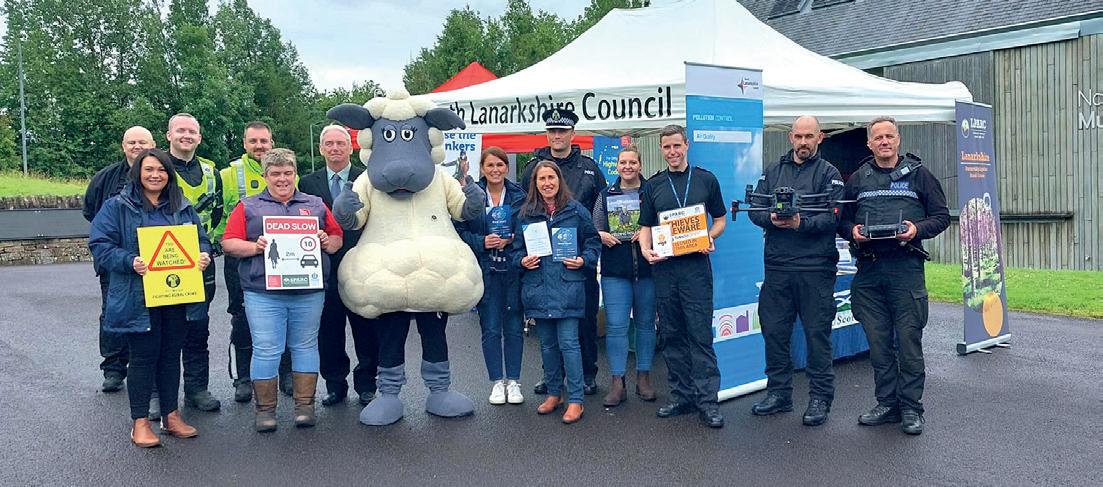
FORTH & CLYDE




LREGIONAL MANAGER
Sheena Foster 07789 796 582 sheena.foster @nfus.org.uk
anarkshire Partnership Against Rural Crime (LPARC) held its fi rst open day hosted by the Museum of Rural Life in East Kilbride. LPARC has been established for a number of years and is focused on tackling rural crime issues within the Lanarkshire communities while feeding into Scottish Partnership Against Rural Crime (SPARC). LPARC looks at how we can impact, educate and work together with local residents to prevent crime and have a positive impact on issues
aff ecting livestock, equestrian, fl y tipping, and fuel, plant and quad thefts.
The open day had members of the partnership organisations such as Police Scotland, British Horse Society, Neighbourhood Watch, Scottish Land & Estates, local authorities and NFU Scotland Forth and Clyde. This was a great way to engage with members of the public to discuss and highlight issues relating to rural crime. The event also saw the launch the Lanarkshire PARC Facebook page – Lanarkshire Partnership Against Rural Crime LPARC.
Within Forth and Clyde there is also the Renfrewshire PARC, Falkirk PARC and Greater Glasgow PARC.
where Duncan was able to show her some of the issues relating to river maintenance. They discussed what opportunities there could be to reduce or remove licence costs to benefi t reduced flooding.
Species management was also discussed, specifically for geese. Problems associated with the lack of long-term funding arrangements for protected species and Greylag management, particularly in relation to the lack of multi-year funding for schemes and a budget allocation that does not reflect increased costs. Similar issues relating to WhiteTailed Eagles were also highlighted. The challenges of managing within constraints of the existing scheme with a growing population and limited budget were top of the agenda.
Duncan welcomed the opportunity to meet with the Minister and believes it was a perfect opportunity to emphasise challenges farmers and crofters in the region have to deal with.
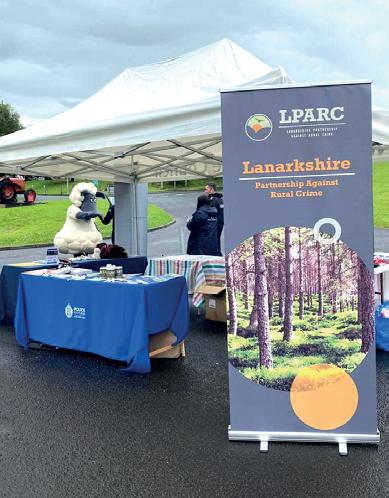
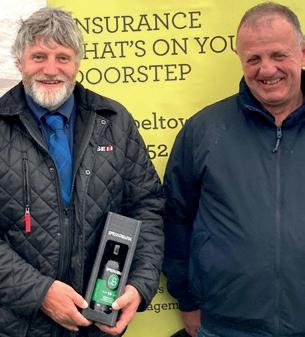

At a busy Kintyre Show, the Kintyre Branch took the opportunity to present Martin Kennedy with a special bottle of Campbeltown whisky. This was in appreciation for all he has done during his terms as President and Vice-President of NFU Scotland.
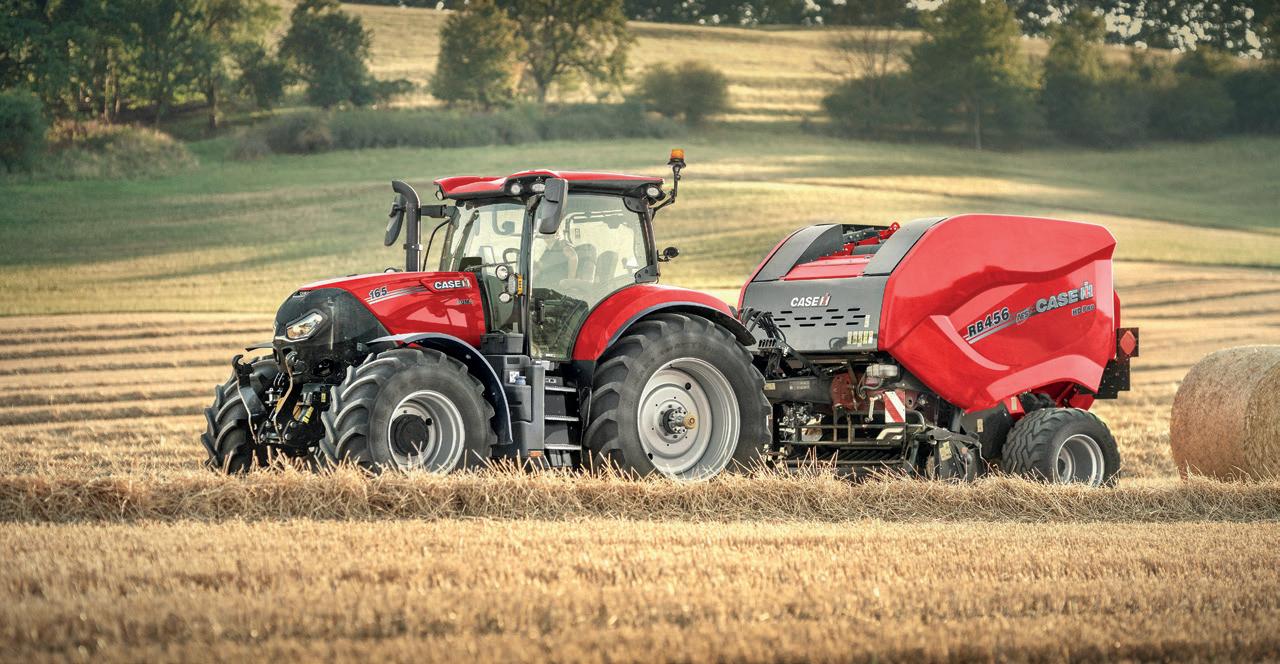
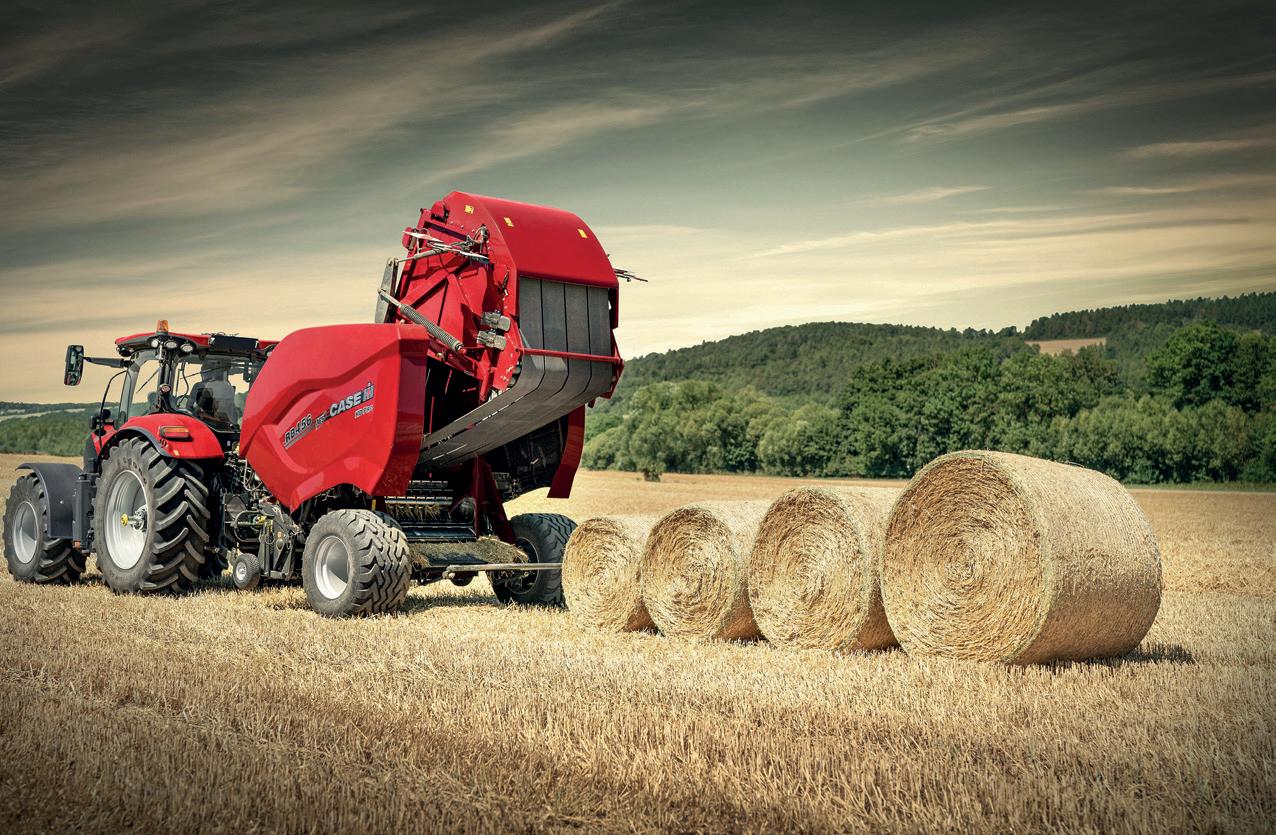
Scottish Machinery Rings are working in partnership with Case IH dealers to provide an exclusive rebate for members on their latest machines including the RB HD Pro Variable Chamber Series.
These balers are the perfect all-rounders. With a heavy duty design, these balers rely on a robust drive line and premium material for maximum lifetime and minimum downtime. The choice is yours with two models to produce bales up to 165 or 190cm, and RotorFeeder or RotorCutter options with 13 or 25 knives.










REGIONAL MANAGER
Kate Maitland
07919 001 23
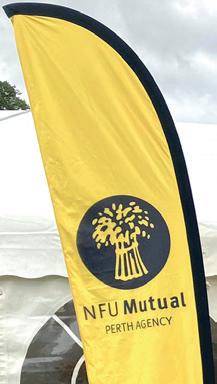
kate.maitland@nfus.org.uk
As another busy show season draws to a close, we congratulate members involved in the shows on their fantastic showcasing events. You cannot underestimate the time and eff ort that goes into preparing for such shows which are not only
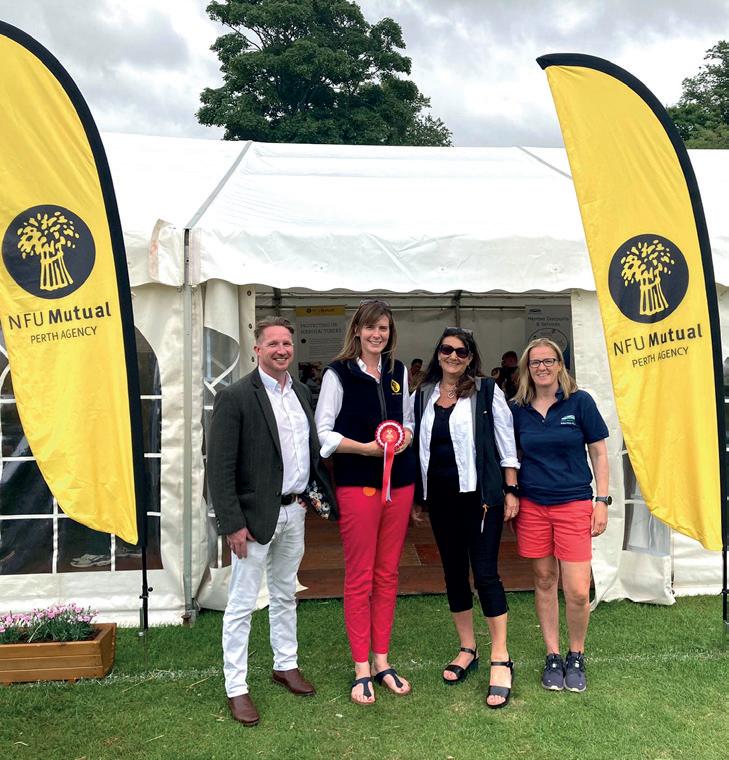
enjoyed by those close to the land but also those in the rural and sometimes urban communities. Our eff orts paid off at Perth Show and we won Overall
Champion of the Trade stands. We’ve used the shows as opportunities to engage with many members and touch base with local parliamentarians.

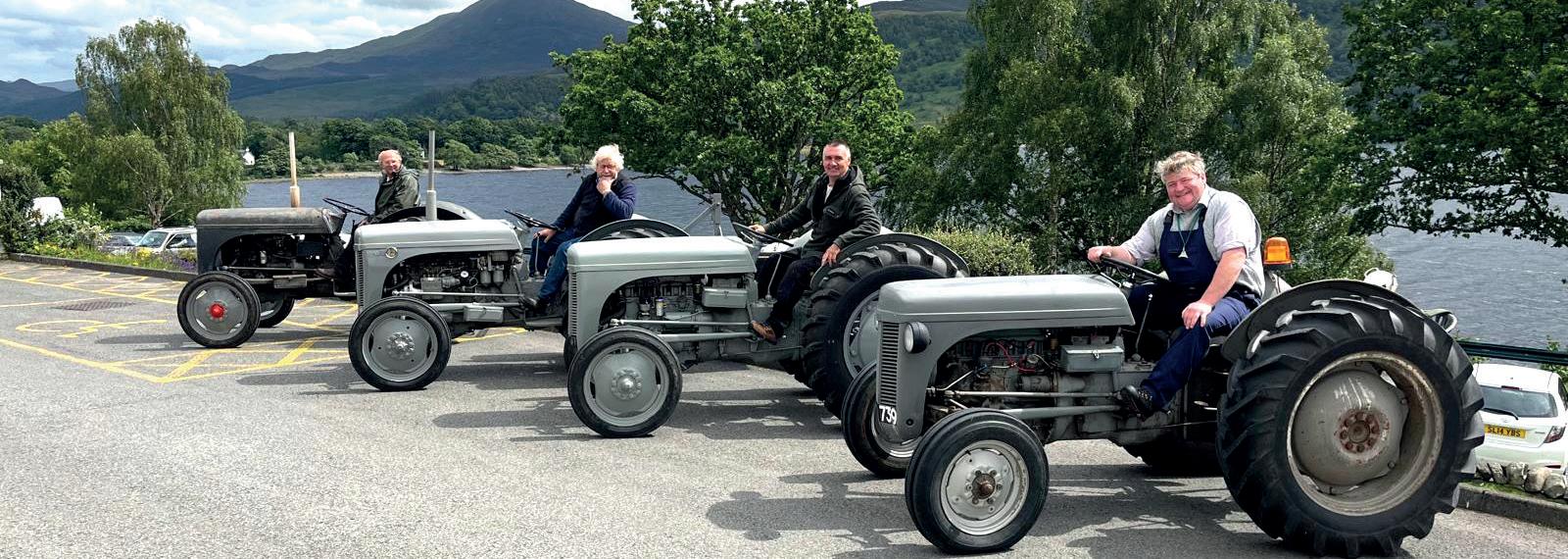
Highland Perthshire Branch’s annual Tractor Road Run congregated at Weller Poley Park, Kinloch Rannoch in support of RHET Perth and Kinross. So far, a total of approximately £1400 has been raised which will help the charity greatly in its work with young people.
This year, 35 tractors of all different shapes and sizes turned up to take part in the event and it was fantastic to see so many locals around to support. This year’s route saw the drivers headup the south side of Loch Rannoch, with a lunch stop at the far end before continuing down the north side and back to the park.




REGIONAL MANAGER
Lorna Paterson
07786 860 453
lorna.paterson @nfus.org.uk
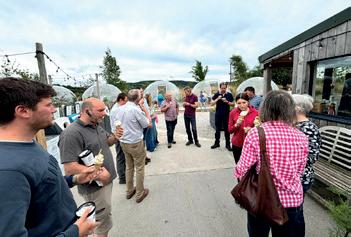
In Central and Buchan branches, a joint farm visit to Kirkton of Kinellar and Glasgoforest Farms Buchan was hosted. Scott Campbell from Kinellarr, gave great insight into the progressive business he runs in conjunction with his wife and father. SRUC’s George Carr also informed members about the various trials ongoing at the farm. William Willis, of Glasgoforest, then off ered a tour of his land and explained how he retails his organic milk direct to the consumer via milk vending machines, homemade gelato and pizzas. An enjoyable sampling session of delicious gelatos concluded the afternoon visit for all.




REGIONAL POLICY ADVISOR
Lee Smith
07554 741 030 lee.smith@nfus.org.uk
Shetland’s agriculture celebrated its first show of the season hosted by Shetland Young Farmers and Shetland Livestock Marketing Group (SLMG). With NFUS Chair Cecil Eunson and myself on hand to help, SLMG opened its mart doors to the public for an open day, allowing them
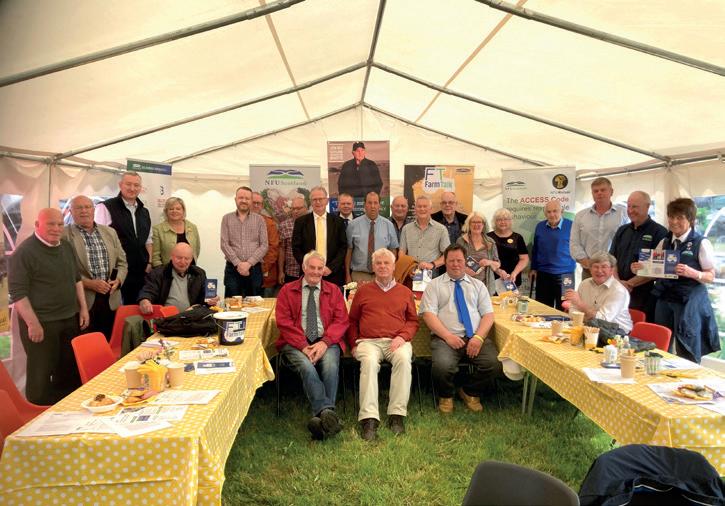
New Deer Show was another fabulous two-day event in July. Local Chair Drew Wilson hosted very interesting discussions with newly elected Seamus Logan MP, local Councillors, and Aberdeenshire Council’s Keith Whyte and Provost Judy Whyte. A highlight of the show was launching our mental health peer support charity, FarmTalk. Provost Judy Whyte was our official ambassador for the event and Sandy Garvock from Men United was there to help Regional Chair, Kevin Gilbert with the launch. This was then followed by BBQ steaks supplied by Woodheads of Turriff cooked by Alan and Elaine Simpson. Members enjoyed the annual Drinks Reception, raffle and auction, which raised over £1200 for New Deer social fund and FarmTalk. Thank you to everyone who supported us throughout. Well done to Group Secretaries Richard and Rosslyn, and their fabulous staff in Keith and Turriff Offices.
Laurencekirk and Stonehaven branches recently hosted a very successful evening visit to Six Degrees North Distillery in Laurencekirk. Stonehaven Branch Chair, Louis Marshall, conducted the meeting and Vice-President Andrew Connon joined in the hugely interesting tour.
to see behind the scenes. It was a great opportunity for the public to visit the mart, have lunch, meet some of the isle’s crofters and farmers, see a huge variety of different island sheep breeds and the amount of work and effort crofters put into looking after their livestock. This popular day included caddy feeding, local businesses advertising their services, a variety of different games, raffles and meeting the show sheep which kept the younger generation entertained.
The Union was also present at Shetland Young Farmers livestock show. With
around 100 sheep entered on the day, Nia Hunter, one of the show organisers said: “It’s been very successful and a great day with a huge variety of sheep.” With local judges casting their eyes over the stock, younger members could have a go at the stock-judging too. Cecil Eunson, SLMG Chair, said: “It’s been an extremely successful day and great to see the support from lots of nonagricultural families. Going forward we hope Shetland Young Farmers consider making this an annual event due to the immense popularity of the event.”
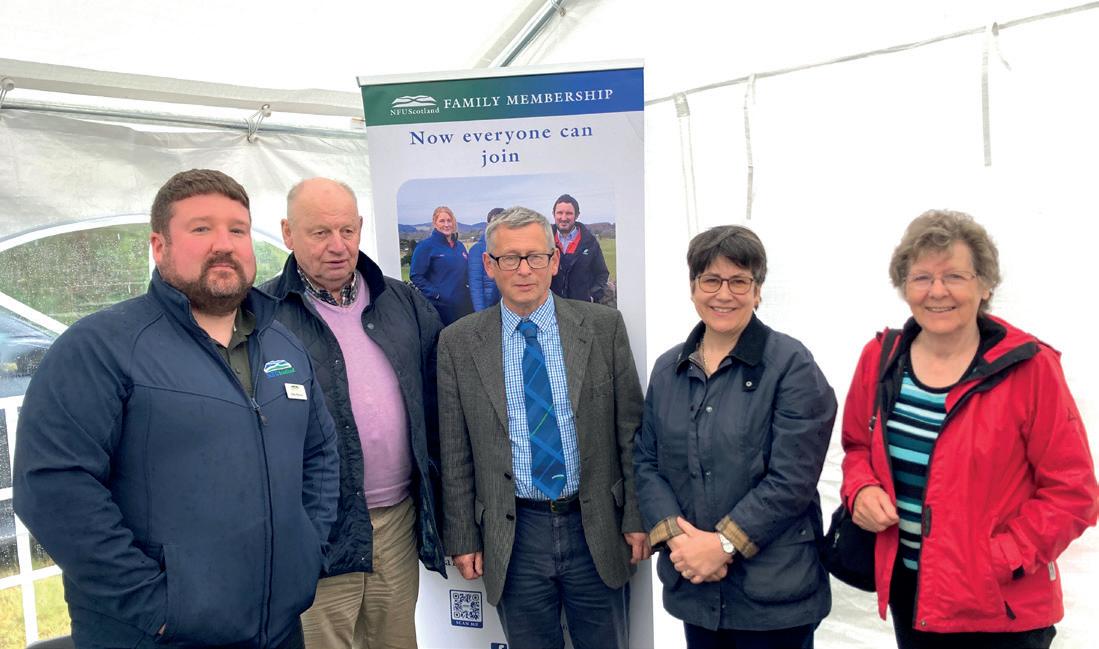
Fettercairn Show was a great success again this year. Well done to Secretary Andy and his superb Laurencekirk team including: Nikki, Ashley, Alfi e and Colin for organising the stand. Our Vice-President Alasdair Macnab, joined Members and local Politicians: Cabinet Secretary for Rural Aff airs, Land Reform and Islands
Mairi Gougeon, and later, Tess White MSP. They discussed various issues important to North East farming including: labour shortages, agricultural profi tability, the Scottish Agricultural Wages Board (SAWB), and the damage and stress caused by protected apex predators, particularly badgers and white-tailed sea eagles.










It’s rewarding to be part of NFU Scotland’s committees and working groups.
NFU Scotland has a dynamic policy team who are ably supported by commodity committees and working groups. The Union’s success has always been reliant on member engagement, as it builds the backbone of our parliamentary lobbying and fuels policy change. These committees and working groups provide the vital link between membership and staff, and help build the core of our Strategic Priorities.
We will shortly be looking for new volunteers to get involved with committees as we fill vacant roles towards the end of this year after individuals come to the end of their periods in post. If you want to find out more and get involved, please feel free to contact the relevant policy team member or regional manager to discuss in more detail.







Policy Manager: John Flanagan


I’m involved in running the family business near Banff, North East Scotland, where we grow 400 acres of exported seed potatoes. I’ve been involved with NFU Scotland for at least 40 years and I believe that as a collective group of like minds, we have more of a say and more influence with Government.





Being part of NFUS is very useful from a business perspective. It means you are in the “know” when it comes to potential changes which might affect your business. It’s also just a pleasure to meet fellow members at meetings and create a sense of fraternity with those of similar interests.
Ahead of the recruitment drive, we asked current Committee Chairs and Vice-Chairs what they love most about being involved.











A current hot topic for our group is the evolving threat of pests and diseases, like potato cyst nematode, various viruses and blight resistance, as examples. All this set against a diminishing toolbox of plants protection products, makes the job that bit harder!









Policy Manager: John Flanagan













I am 50 years old, married to Gillian and we have four boys. I farm in partnership with my parents, who are still actively involved in our tenanted farm on the Northeast coast, near Portsoy. Our business comprises of finishing storebought cattle, growing grass for silage and a small acreage of Winter Barley for cattle feed. The rest of the ground is allocated to growing Spring malting barley.


I got involved with NFU Scotland after attending my local branch meetings in Keith, which now seems so long ago! I felt it was the next move after being involved with SAYFC (Scottish Association of Young Farmers Clubs) and was a great way to learn how to make a difference.

























We have a strong, passionate committee in the North, with well attended meetings.
















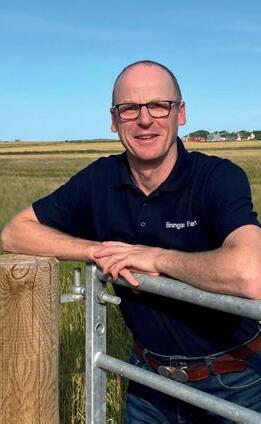










I would encourage everyone in the farming sector to get involved. It gives you a great sense of achievement to think your ideas could make their way to our Presidential team and beyond!

A very hot topic has been the proposed introduction of Digital Grain Passports (DGP). The current stance is Scottish growers are happy with the paper-based system, given the perceived complications of the industry of moving to the DGP. involved. gives








Name:

Committee: Crofting, Highlands and Islands Committee (CHIC)

Policy Manager: Rhianna Montgomery




Get involved with the








I have recently moved into the role of Chair after a year as Vice-Chair. Born and brought up on Islay to a crofting family, I have a lifetime of practical experience in crofting agriculture. I have put this experience to good use on a day-to-day basis both at home and in my professional work. I have over 30 years’ experience working for the Department of Agriculture and also with the Crofting Commission as Head of Crofting Development. Through these roles I
























































have gained the experience required for influencing crofting policy and legislation.


I find that this background knowledge has really helped me to support CHIC and I am looking forward to my time as Chair.
I would encourage anyone in the crofting community to get involved in the NFUS committee.























































Committee: Less Favoured Areas (LFA)
Policy Manager: Lisa Hislop








I’ve been involved with the Less Favoured Areas (LFA) Committee for several years now, and this is my second year as Chair. As a committee, we have always been at the heart of the debate on future support. Historically, it was successful in securing the Less Favoured Areas Support Scheme (LFASS) beyond Common Agricultural Policy (CAP) Reform which potentially threatened its future. We continue to have healthy debate and discussion that ensures the continuation


of support for Scotland’s LFA. Recently, we met Cabinet Secretary Mairi Gougeon to underline the importance of Less Favoured Areas and the unique challenges we face. While support is one element of committee discussion, it is important we consider wider land use policy development such as peatland, forestry and crofting, when ensuring LFA farms and crofts continue to underpin rural Scotland. We also work closely with the Livestock Committee to ensure that extensive livestock grazing is rewarded and recognised. I am looking forward to the next few years on the committee. There is definitely a great opportunity for to really shape the replacement of LFASS and Scottish Upland Sheep Support Scheme (SUSSS) while also focusing on elements which contribute to successful businesses.















































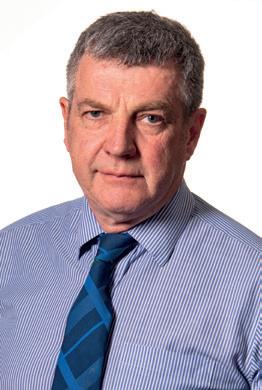
























This is my third year as Livestock Committee Chair. While we have covered a lot of ground in that time, our focus remained on underling the importance of Scotland’s livestock farming. The committee covers a huge variety of topics from animal health, quality assurance, future support and the supply chain development. We work closely with other industry

Policy Manager: Lisa Hislop












stakeholders to ensure members are supported and rewarded. We have fantastic representation from across all membership regions which stimulates great debate and discussion. While the past year has been challenging working on the Calf Scheme Reform, it has been great to see the committee take “the bull by the horns” and help secure a £40million budget until 2028. This offers the opportunity to safeguard direct funding for our sector over the next few years, while also incentivising productivity and efficiency of suckler herds.














Committee: Environment & Land Use (ELU)

Policy Manager: Sarah Cowie




I have been Chair of the Environment and Land Use (ELU) Committee for nearly four years and have sat on the Committee since 2015. There has been some major ideological changes to our remit in this period, and ELU has gone from being a junior partner within NFUS to being an all-encompassing cog for Scottish food production.
I work closely with Policy Manager Sarah Cowie, who has a myriad of consultations and land use concerns to sift through on a daily basis. We try to appreciate all concerns but consistently reiterate that the primary land use in Scotland is food production.




As a committee, we cover a lot of topics: biodiversity, carbon, forestry, species







































management, peatland, muirburn, flooding and water quality, natural capital, to name a few. Recently we had a fruitful visit to the Hutton Institute at Glensaugh, and met with NatureScot, SEPA and Scottish Government.






I am often asked what I learn from these meetings and while this is an important question, I say what’s more important is “what did they learn from us?”








Committee: Legal and Technical (L&T)








Policy Manager: Rhianna Montgomery





My father, who had always been a member of the Union, urged me to join NFU Scotland so I got a better understanding of the work involved in policy changes. Since then, I have been a branch Chair, Council member, a member of the Legal and Technical (L&T) committee, before taking on the role of Chair last year.





The work that the L&T committee covers may seem a complicated subject, but it affects every business no matter what you are doing. Over the past few years, we have covered many important and complicated topics including Land Reform, taxation, housing issues and utilities issues to name a few.
The Committee meets three times a year, with regular ad hoc meetings in between to discuss the ever-changing



































































policy environment. We have recently had a strong focus on Land Reform, with the opportunity to meeting with the Union’s Policy Team to convey concerns.




If a vacancy comes up in your region for L&T, don’t be put off by thinking you don’t know enough. We have the specialists on hand to help, you just have to convey through your own regional monitor meetings what is happening.















Policy Manager: Lucy McGillivray





































As Chair of the Horticulture Working Group, I have had the opportunity to engage with all the stakeholders involved in Horticulture. The challenges of market returns, labour costs and availability, and the importance of local produce, have all been highlighted to politicians and retailers.


The groups priority this year has been the new future support framework and what must be included in Tier 3 to ensure horticulture sector is profitable and sustainable.
Fairness in the supply chain is another key issue as well as the Fair Work policy and the replacement of the Fruit and Vegetable Aid Scheme. All of which the group has covered this year. We hope more members will consider joining us later this year if vacancies become available.






























































Lucy McGillivray to










I’ve been involved with the Next Generation Committee since 2019. I started as the Milk Committee Representative, then Cereals Committee Representative before becoming the current Livestock Committee Representative and Next Generation Chair. During this time, I have gained a good understanding of how the Union operates and the opportunities Next Generation has to voice opinions and ideas.

Committee: Dairy





I was delighted to take on the role of Chair at the start of this year. Since then, I was pleased to help launch a partnership agreement between NFU Scotland and Scottish Association of Young Farmers Clubs (SAYFC). This has already strengthened our working relationship to ensure we are delivering for the next generation of Scottish farmers and crofters.



This year, the Committee is focused on ensuring the next generation are supported by the new future support framework. I am passionate about the future of our industry and will strive to help to promote it. Being involved in a NFU Scotland committee is a way of doing so.


Policy Manager: Tracey Roan





I’ve been involved with NFU Scotland since 2018. I started as a Committee member at my local branch, was elected as Next Generation Chair in 2019 and am currently Vice-Chair of the Milk Committee.










I have also had the pleasure to represent Dumfries and Galloway as Regional Chair, a job which allowed me to meet numerous members, politicians and businesses. These four years were a highlight of my farming career. To be trusted to speak on behalf of my peers, was a job I never took for granted.

NFUS has opened up many opportunities for me personally. Although I stepped down as Regional Chair, I was pleased to take on the role as Vice-Chair



































of the Milk Committee as well as take up a new role with AHDB (Agriculture and Horticulture Development Board) on their Dairy Sector Council.











A key win for the Milk Committee after more than a decade of campaigning by UK farming unions who called-out unfair practices in the dairy supply chain, new legislation on dairy contracts has come into force this year.





Policy Manager: Penny Middleton









As a group, we meet between three and four times a year with a mixture of in- person and online meetings. We also have occasional ad hoc meetings throughout the year to discuss important and time- sensitive issues.
Aside from meetings, the Pigs Committee also tries to include a few field visits. We recently visited the docks at Glasgow to see what happens when soya comes into the country. This helped us understand the challenges around certifying deforestation and conversion free soya.

















Involvement in the Committee is a great opportunity to understand and influence the issues affecting this sector. The pig

























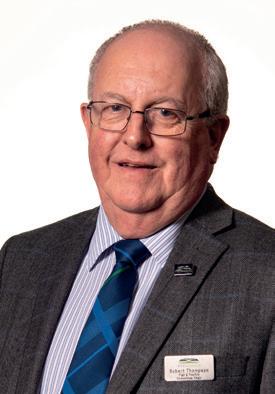










industry has faced big challenges in the past few years and there are some significant issues on the horizon such as considering a ban on the use of farrowing crates and compulsory contracts. It is important that we have representation from the sector and getting involved with the Working Group ensures your voice is heard.









































Policy Manager: Penny Middleton































I really enjoy my involvement in the Poultry Working Group. We meet every couple of months, alternating between online catch-ups and in-person meetings. The value in speaking to other producers and packers on issues affecting them is invaluable on its own, but also having a direct input to policy development is really rewarding.


Everyone in the Group has a real opportunity to guide the work the Union does for the sector. It is vital we continue to have that input and sense-check from across the sector to ensure we are properly represented.



My time as Chair has been really fulfilling, I have learned so much about how policy is developed and the challenges involved. I have particularly enjoyed my time on the Board of Directors, with the opportunity to raise the profile of the poultry sector and all we achieve as an unsupported sector. It is critical that our voice continues to be heard at Board level.







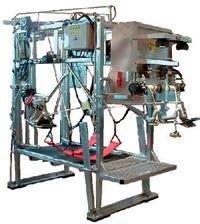



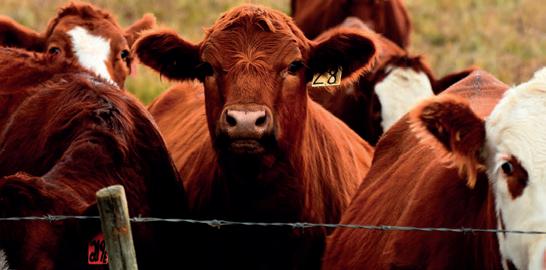






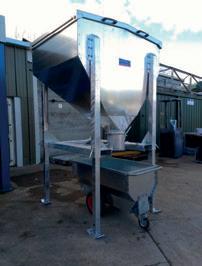



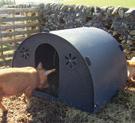
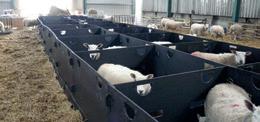




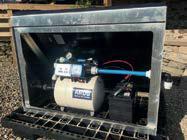
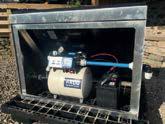

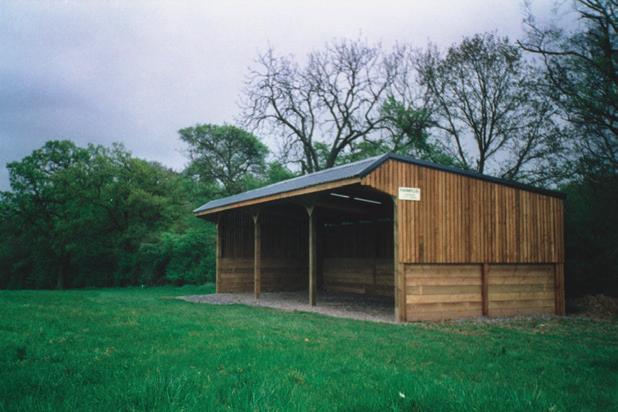

































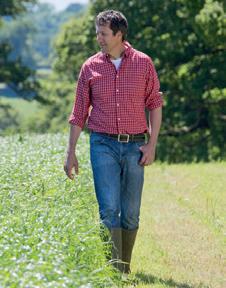

Our Farm Business Consultancy team provides a range of services including strategic farm business management, evaluation of subsidies and grant applications (IACS/SAF) and ongoing advice relating to the new subsidy regime, including carbon auditing and nutrient planning.
Galbraith has expanded its Farm Business Consultancy team to offer support for existing and new clients throughout the UK as a result of the uncertainty surrounding the future subsidy regime and fluctuating commodity prices.
• Subsidy Advice (IACS)
• Farm Carbon Audits
• Forward Budgeting & Planning


• Natural Capital & Biodiversity Farm
• AMC Finance
• Agricultural Reports


• Expert Witness Advice
• Farm Reviews
• Farm Management


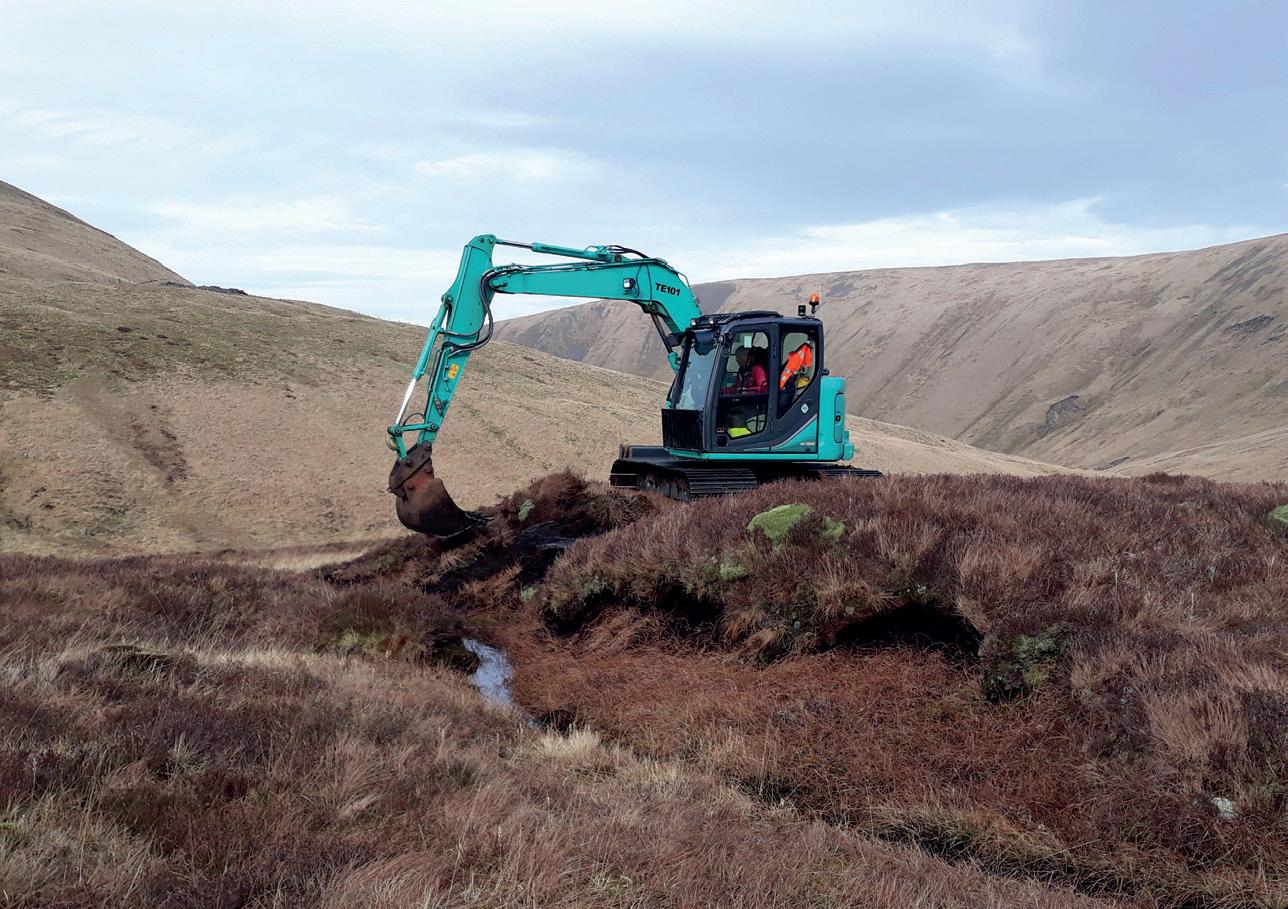
Climate change is the most serious threat to Scotland’s environment. Early action is central to overcoming these impacts.
Peatland restoration offers a solution.
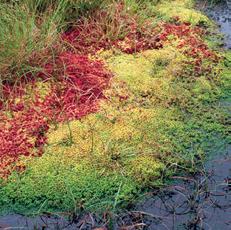


Helping us to reduce the effects of climate change by storing carbon.
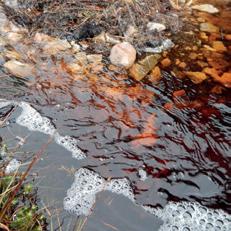
Benefiting farming through mutally beneficial grazing, and improving access for both stock and people.
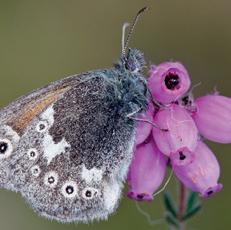
Regulating water flow and quality, improving flood management, fisheries and source water supplies.
Internationally important habitats, home to rare and often unique plants, invertebrates and birds.
We provide bespoke advice on restoration management and funding.
Contact us: peatlandaction@nature.scot Follow us: @PeatlandACTION